Art of Living denies links to Hindu terrorists
NEW DELHI, Nov 22: The Art of Living categorically denies the Star News report of November 21, 2008 allegedly linking Lt. Col. Purohit's activities with those of the Art of Living.
For 27 years, the Art of Living has been actively spreading the message of peace across the world. We denounce terrorism and have been working to counter all forms of it through our various programs and service projects. Our passion is to interact with terrorists to bring about a positive transformation within them.
Guruji meets thousands of people everyday. Col. Purohit had visited the ashram and may have met him in a darshan line.
Art of Living teachers are invited to do courses for people from various sections of society, including police, army, prisoners etc. One of our instructors, Jigish, was invited to conduct a course at a regular military establishment. Jigish taught the Art of Living course for a couple of hours for three days, and was escorted out of the campus after the course every day. we had no clue about what they were doing or what they were into after the Art of Living course.
We do not in any way endorse what any other organisation does. Just as a doctor treats patients but does not endorse their other activities.
The allegations made by Star News are completely unfounded and baseless. Linking the organisation with terrorist activity is absurd. It clearly shows the intention to sensationalise and malign the organisation.
We are an organization working towards creating a stress free, violence free world and will continue to work with all sections of society in this mission.
1000 sitarists perform together for world peace at AOL concert
NOIDA, Nov 21: The Art of Living today hosted a historic event, Brahm Naad, where 1000 sitarists performed together on one platform, in a first-of-its-kind concert. Slated to find its way into the Guiness Book of World records, the proceeds of this initiative are dedicated to the relief & rehabilitation of flood-ravaged Bihar.
At the event, His Holiness Sri Sri Ravi Shankar was also felicitated by Live Earth, which has been founded by Kevin Wall, in partnership with former U.S. Vice President Al Gore, to highlight the notable work done by the Art of Living for the Mission Green Earth Stand Up Take Action 2008 – a project which envisages the plantation and nurturing of 100 million saplings, across the globe, to help reduce global warming.
The evening also saw a pledge by the audience in support of the Art of Living anti-tobacco campaign which is being supported by the Ministry of Health and WHO.
Brahm Naad, conceived by the Art of Living founder and spiritual guru, His Holiness Sri Sri Ravi Shankar, has a two-fold purpose; to popularise Indian classical music even while uplifting its practitioners and to epitomize the universality and unifying power of music to spread the message of peace and harmony.
Says Sri Sri Ravi Shankar, "Music connects the individual to the universal spirit. Music is that rhythm & harmony that flows from the universal to the individual; from the cosmos to the finite." Stating that music uplifts the mind and body he urged the youth to take up classical music.
The music for this 1000-piece sitar orchestra is based on ancient ragas from the Gandharva Veda, namely Raga Gara, Bageshri and Hansadhwani, which conceptualize the all encompassing love for the Divine through the fascination and pull of love, the anguish of longing and the final culmination through divine union.
As a testimony to our multi-ethnic heritage and cultural vitality, sitarists from all religions, castes and sections of society, came together in this celebration of unity and harmony. These included starits aged 6 -70 years of age, incuding visually challenged sitarists, child prodigies, young students from renowned schools of classical music, artistes from All India Radio, senior practitioners of this art, among others.
Sitar exponents from Australia, USA, France, Abu Dhabi and almost all states across India, including Maharashtra, Karnataka, Haryana, Gujarat, Madhya Pradesh, Himachal Pradesh, Andhra Pradesh, Assam, Uttar Pradesh, Rajasthan, West Bengal, Jammu and Kashmir, Delhi & NCR, among others, were part of this historic ensemble.
Sitarists also included students from various schools and universities namely Shantiniketan, Gandharva Maha Vidyalaya (across India), Bhatkhanda Music School, Vishwabharati University, Delhi University, Banaras Hindu University, Gorakhpur University and Sangeet Kala Academy.
Present, among the audience, were eminent dignitaries including Ambika Soni, Ministry of Tourism & Culture, Pt. Shiv Kumar Sharma (Santoor), Raja & Radha Reddy (Kuchipudi dance), Erika Mann, Member of European Parliament, Vinod Khanna, MP, among others.
This initiative is also being supported by the Ministry of Culture & Ministry of Tourism, Govt of India. Pandit Shiv Kumar Sharma said, "This is a miracle happening. This has been possible due to the blessings of Sri Sri. I am privileged to be here."
When the strings of 1000 sitars were plucked in unison, all barriers, definitions and prejudices were transcended. Capturing the confluence of spirituality with music, the evening was a triumph of the brilliance of Indian classical music and a spectacular demonstration of this ancient legacy of India.
Sri Sri calls upon all leaders to be proactive in stemming violence
MONTREAL, July 27: Spiritual leader His Holiness Sri Sri Ravi Shankar strongly condemned the serial bomb blasts in Ahmedabad and Bangalore saying that the Indian people cannot tolerate such violent acts of terrorism any more.
In a statement from Montreal, Canada, he called upon all community leaders to help maintain peace and calm. "Police alone cannot do much to check violent terror attacks," he said.
In the wake of the terror groups Indian Mujahideen and HuJI claiming responsibility for the recent blasts, he called upon Muslim leaders to play a proactive role and isolate the misguided elements spreading terror in the name of religion.
Emphasizing that violence in society cannot be justified under any circumstances he has appealed to all to maintain peace and calm
Sri Sri Ravi Shankar meets Sanjay Dutt in prison
PUNE, Nov 17: At a reformation programme organised at the Yerawada Jail, Sri Sri Ravi Shankar, founder of the Art of Living Foundation, met Bollywood actor Sanjay Dutt, who is lodged in the Pune jail in connection with the 1993 Mumbai blasts case.
Sri Sri Ravi Shankar conducted a Yoga-based spiritual congregation for the prisoners here today.
Among the participants was actor Sanjay Dutt, who is currently serving a jail term at this prison.
Sanjay Dutt, along with 300 fellow-inmates, sought lessons from the well-known spiritual guru.
Sri Sri Ravi Shankar cheered up the actor, who was sentenced to a jail term of six years under the Arms Act by the TADA court for illegal possession of arms.
"Like Mahatma Gandhi served a sentence in Yerawada Jail, he (Sanjay) too is here for a while. I told him to believe as if he was paying a penance, soon all would be right," said Sri Sri Ravi Shankar, after meeting Dutt.
During the one-hour long congregation, Sri Sri Ravi Shankar shared a word about peace and humanism with the prisoners.
"Once these prisoners are out, we will provide them with some work for their rehabilitation," said Sri Sri Ravi Shankar.
Krishna the Teacher - I
Dr Sarvepalli Radhakrishnan
 Though the Gita accepts the belief in avatara as the Divine limiting Himself for a purpose on earth, it also lays stress on the eternal avatara, the God in man.
Though the Gita accepts the belief in avatara as the Divine limiting Himself for a purpose on earth, it also lays stress on the eternal avatara, the God in man.
The two views are not incompatible with each other. The teacher, interested in the spiritual illumination of the human race, speaks from the depths of the Divine in him.
Krishna's avatara is an illustration of the Spirit in us, the Divine hidden in gloom. According to the Bhagavata Purana, "at midnight, in the thickest darkness, the Dweller in every heart revealed Himself in the divine Devaki, for the Lord is the self hidden in the hearts of all beings."
The meaning of the birth of Krishna is the fact of redemption in the dark night. A sudden flash, an illumination and life is seen fresh and new. When the Divine birth takes place within us, the scales fall from our eyes, the bolts of the prison open.
The Lord abides in the heart of every creature and when the veil of that secret sanctuary is withdrawn, we hear the Divine voice, receive the Divine light, act in the Divine power. The incarnation of Krishna is not so much the conversion of Godhead into flesh as the taking up of manhood into God.
The teacher slowly guides his pupil. The pupil, Arjuna, is the type of the struggling soul who has not yet received the saving truth.
He is fighting with the forces of darkness, falsehood, limitation and mortality which bar the way to the higher world. The rider in the chariot of the body is Arjuna but Krishna has to guide the journey Every individual is a pupil.
With faith, God becomes the guide. As for the validity of the teaching, it is of little moment whether Krishna is a figure of history or God descended into man, for the realities of the spirit are the same now as they were thousands of years ago.
Global conference to harness women power
By Deepak Arora
NEW DELHI, June 5: Women visionaries from around the world will come together to harness the women power to create a better world. The International Women Conference to be hosted under the banner of the Art of Living from June 8 at the Art of Living International Centre in Bangalore will resolve to educate 500 girl children in India and empower 1,000 women prisoners across the globe.
The three-day event to be inaugurated by Sri Sri Ravi Shankar will have an all-inclusive approach to engage all stakeholders in addressing issues concerning women in particular and humanity in general.
Bhanumati Narsimhan, sister of Sri Sri Ravi Shankar and Chairperson of the conference says, "The whole idea is just to learn from each other and to create a feeling of oneness among people of diverse backgrounds and to spread more smiles by creating an atmosphere of celebration and service to humanity."
Bridging the urban-rural divide in the development process, over 550 women delegates from rural and urban backgrounds will rub shoulders and deliberate ways to empower women in all spheres of society.
On the second day 800 college girls from the city will join the conference. 54 speakers will present their formulae for a just and peaceful world. Women from diverse backgrounds who have epitomized Shakti - the Power of a Woman and made a difference to society will participate.
The conference will begin with the inauguration of the Tejaswini exhibition by Mrs. Shiranthi Rajapakse, First Lady of Sri Lanka, Lady Sarojni Jugnauth, First Lady of the Republic of Mauritius and Mrs. Megawati Suekarnoputrii, Former President of Indonesia.
Top cop Kiran Bedi, CEO of Biocon Industries Kiran Mazumdar Shaw, entrepreneurs, policy-makers, parliamentarians and government representatives from South Africa, Pakistan, Sri Lanka, Indonesia, Jordan, Afghanistan, Mongolia and other eminent women from the UK, USA, Italy, Germany and Australia will attend the conference.
Lata Usendi, Minister for Women and Child Welfare, Chattisgarh, of rural origins will be one of the 250 rural women from India participating in this event.
The conference will offer a platform for women to share their insights, experiences and find ways to support one another, to appreciate and honour the values, skills and inherent potential of women from all walks of life.
Discussions will be held on subjects on three themes – Iccha Shakti (the Power of the Will), Kriya Shakti (the Power of Action) and Gyan Shakti (the Power of Knowledge).
Accordingly, on Day One (Iccha Shakti), there will be sessions on 'Women's Leadership Forum: A Vision for Women in Global Leadership'. Day Two (Kriya Shakti) will have discussions on 'Campaigning against Female Foeticide', 'Action for Environment Sustainability', 'Action for Economic & Social Development'.
Day Three (Gyan Shakti) will focus on 'Quest for Awareness & Value Education', 'Quest for Ancient Sciences & Arts' & 'Quest for Peace'.
Among the activities there will be yoga with music, pledge for peace to create a violence-free, crime-free world, watering of Laxmi Taru saplings and a workshop on 'My Idea of a Beautiful World'. There will also be performances by Hema Malini, Usha Uthup, Rashme Hegde Gopi with her troupe, Hema Sardesai and also by the Lady Clown of the World Parliament of Clowns.
The conference partners are International Association for Human Values, Ved Vignan Mahavidyapeeth, VISTA India (Value Integrated Services to All – India) and UNIFEM.
Indian spiritual Guru on landmark visit to Iraq
By Deepak Arora
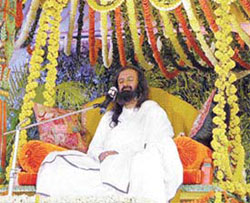 NEW DELHI, May 21: Indian spiritual Guru, Sri Sri Ravi Shankar, is making a path-breaking visit to Iraq on Tuesday and will meet both Sunni and Shia leaders, as well as Government and opposition leaders.
NEW DELHI, May 21: Indian spiritual Guru, Sri Sri Ravi Shankar, is making a path-breaking visit to Iraq on Tuesday and will meet both Sunni and Shia leaders, as well as Government and opposition leaders.
It is a unique and dangerous visit and a first of an Indian spiritual leader’s foray into this hellish war zone.
On Monday, Sri Sri gave a public talk in Jordan. Before leaving for Iraq on Tuesday, he will have meetings with King Abdullah, Queen Rania Al Abdullah, and Prime Minister of Jordan
On his arrival in Baghdad, he will have a meeting with Iraqi Prime Minister Nouri al Malaki. Next day (Wednesday), he will address a public gathering where several political leaders, members of Sunni Party, Shia Party, Kurdish Party and general public would be present. Names of top leaders not revealed because of security reasons.
On May 24, he will visit the Art of Living trauma relief center in Baghdad. Same day he will return to Jordan to give a talk at University of Jordan. On May 25, he will attend Jordan Day of Independence. A VIP reception is also being held in his honor.
Since the beginning of the war in 2003, spiritual Guru’s Foundation, the Art of Living, and its sister humanitarian concern, The International Association for Human Values, have been working under trying circumstances to help the Iraqi people overcome the deep pain and suffering they are experiencing, with the help of ancient Indian practices such as yoga, meditation and breathing techniques.
The volunteers have conducted trauma relief courses in various parts of Iraq, especially in Baghdad. Medicines, food and clothes were also offered. For the first time, people who had not been able to close their eyes for days together because of constant bombing and killing were able to sleep, thanks to the breathing and meditation techniques. Many got relief from depression, anxiety, blood pressure, migraine and other psychosomatic disorders resulting from war-related stress.
At a time when most NGOs were compelled to evacuate their volunteers from Iraq in the wake of heightened unrest, kidnapping, the Art of Living stayed put. Moved by this dedication, many Iraqis have completed special trainings to impart the Art of Living techniques to the Iraqi people.
In 2006, a batch of 43, mostly women, graduated to be Art of Living teachers. So far, 5,000 Iraqis have undergone the Art of Living trauma relief workshops apart from attending Ayurvedic training camps. The Art of Living has also initiated a women empowerment project under which local women are given vocational training such as tailoring and computer skills. Over 500 women have benefited from the programme.
As many as 420 community leaders have been trained in providing trauma relief skills. 20,000 individuals have benefited from the assistance offered by medical personnel providing free consultations and medicines.
The International Association for Human Values and the Art of Living Foundation plan to develop three more Women’s Leadership Centers in Iraq. Throughout a one year period the various programs will train 10,000 Iraqi women to become community leaders. Based on a preliminary evaluation of the impact made by each woman trained in previous phases of WEP (Women’s Empowerment Programme), it is estimated that the program will indirectly impact 150.000 people in one year.
The organization’s primary objective is to assist, educate, and encourage women to be the catalysts, messengers, teachers, and leaders that represent the importance of empowerment and education throughout Iraqi society, and in such a manner become the foundation for successful peace initiatives.
Yoga does not belong to an individual
NEW DELHI, May 17: As a Yogi I do not get sad at the misfortunes of the modern day man, nor do I get overjoyed at his fortunes. Everything that happens is for a purpose and part of the divine plan.
A lot of hullabaloo is being made with regard to patenting of Yoga. This is a redundant exercise as legal experts say that there is a WTO agreement which provides that the cultural heritage and the medicinal plants of a country are out of the purview of patenting. And everyone agrees that Yoga originated in India and is considered part of the culture of India.
It must be assured to all human kind that Yoga is not the domain of a region. Yoga means a union with yourself (divinity unrealised). Yoga does not and cannot belong to an individual. Yoga is for a yogi and a yogi is beyond the scope of a religion or country.
Ashtanga Yog (yama, niyama, asana, pranayama, pratyahara, dharana, dhyan and Samadhi) is an eight-limbed Yoga and not eight-step Yoga and with one limb missing it is incomplete.
In the present debate of patenting Yoga we are talking about only asana which is just a limb. A person who thinks asana is Yoga and who is patenting asanas and is thinking he is patenting Yoga needs to go back to the kindergarten of Yoga.
This debate would at least tell the whole world what Yoga is and would save many from being cheated by these unscrupulous business men in the garb of yogis, whose only purpose is to make money at the cost of the gullible.
Yoga should not be patented: Ramdev
 SHIMLA, May 16: Stressing that yoga was a centuries-old Indian tradition, popular yoga guru Swami Ramdev urged the government and yoga organisations to prevent it from being patented overseas.
SHIMLA, May 16: Stressing that yoga was a centuries-old Indian tradition, popular yoga guru Swami Ramdev urged the government and yoga organisations to prevent it from being patented overseas.
'Since there are attempts to patent this tradition (of yoga) in America, the Indian government and yoga organisations should take measures to prevent it,' Ramdev said here.
'Yoga cannot be patented as it belongs to the entire country and humanity. Also yoga cannot be run like a company,' he said here late Tuesday.
'I do not wish to name any individual, but how can yoga be taught at a controlled 45 degrees centigrade temperature when it is ideally taught in the cold Himalayas,' Ramdev said, referring to Indian-born Bikram Choudhary's method of teaching yoga. Choudhary teaches this technique in California and has even reportedly patented this method of yoga recently.
Ramdev also criticised the Indian health ministry for 'turning into an allopathy ministry by promoting only allopathy and neglecting ayurveda'.
'The health ministry must sort its own health first and stop sending regular notices to me,' he said.
'Around 10 percent of the population of India is suffering from diabetes. Yoga and ayurveda are one of the most effective ways to cure this deadly disease.'
'We have carried out studies at our centre by treating patients suffering from many kinds of cancer through yoga and ayurveda. A book is being brought out by Patanjali Yogapeet shortly as a documentary proof,' he claimed.
Patent for yoga Opposed
NEW DELHI, May 16: Angered and alarmed, a good number of yoga enthusiasts and experts in the capital are strongly opposing attempts of patenting yoga overseas.
Reacting to recent reports of yet another application filed in the US for patenting yoga, experts here feel that the very idea of patenting knowledge like yoga violates the art.
'Patenting of any kind is highly unjustified and when it comes to patenting yoga, it is even more criminal. The entire issue of patenting is very corporate,' said Navtej Johar of Abhyas, a yoga centre in the capital.
'Patenting an invention is understood but patenting organic matter like turmeric, neem and then knowledge like yoga is very unfortunate,' he added.
Saying that yoga belongs to the country and the entire human race, yoga guru Swami Ramdev also echoed Johar's thoughts on the patenting issue.
'Yoga can't be owned and run like a company. Since there are attempts to patent this tradition (of yoga) in America, the Indian government and yoga organisations should take measures to prevent it,' Ramdev said in Shimla Tuesday.
A Sanskrit word, yoga means the union of body and soul and is being practised in India for thousands of years. Yoga finds mention in scriptures - the Upanishads and Puranas - composed by the Aryans in the Vedic and post-Vedic period.
'Yoga has its roots in India. How can anyone else think of patenting it?' asked a surprised Deepika Jindal, wife of steel baron Ratan Jindal and an ardent yoga enthusiast.
'That's the thing with us. We don't take our possessions seriously until someone else tries to grab it from us. Patenting of yoga overseas must not happen,' said Deepika.
Author Suketu Mehta of 'Maximum City: Bombay lost and found' fame goes one step ahead saying that if the copying of western drugs is illegal so should be the patenting of yoga. 'After all, this is also an intellectual piracy stood on its head,' he said.
Kiran Sawhney of Fitnesolution, a fitness and yoga centre in the capital, said yoga as such can't be patented but a particular style can.
'How can you patent yoga? It's knowledge. But yes, if someone has devised a particular style then that can be patented,' Sawhney said.
She said that hot yoga, which is essentially yoga in a steam room, was devised by Indian born Bikram Choudhury, who teaches in California and has recently patented it.
Interestingly, Ramdev referred to this style of yoga and said: 'How can yoga be taught at a controlled 45 degrees centigrade temperature when it is ideally taught in the cold Himalayas?'
The US Patent and Trademark office has issued 150 yoga related copyrights, 134 trademarks on yoga accessories and 2,315 yoga trademarks.
Taking a cue from this, the Indian government has set up a task force that is cataloguing traditional knowledge, including Ayurvedic remedies and yoga postures to protect them from being pirated and copyrighted by foreigners.
The data, which will be translated from ancient Sanskrit and Tamil texts, will be stored digitally and be available in five international languages.
MPs unite to slam patenting of yoga by US
NEW DELHI, May 15: Members of Parliament (MPs) today slammed the US patenting authority for granting yoga-related copyrights to American companies, saying yoga is a part of Indian heritage.
Terming the whole exercise as preposterous, the MPs said yoga had originated in India.
Till date, the US Patent and Trademark Office has granted 150 yoga-related copyrights, 134 patents on yoga accessories, and 2,315 yoga trademarks.
In response, our Government has set up a task force to create a database of yoga techniques in order to stop others from patenting the centuries-old knowledge.
"Patanjali's Yog shastra was written more than 5,000 years ago. All the asanas (poses) practiced today have been described in that. So that means, Yoga is an Indian product. Therefore the Government should take immediate action against the US patenting yoga," said Vijay Kumar Malhotra, spokesperson of the Bharatiya Janata Party (BJP).
Old Sanskrit and Tamil texts, including ayurvedic remedies and hundreds of yogic poses, are in the process of being translated and stored digitally. The Government is also cataloguing ayurvedic medicines.
This information will be made available in five languages so that patent offices around the world can access it and know that they originated in India.
"Yoga is not related to modern science. It was developed by hermits in our country. So,I think America cannot patent it. They must have got to know a few benefits of yoga, and got them patented," said Swami Adityanath, another BJP MP.
"Yoga is a part of Indian tradition, it took birth in India. Whether we get the patent for yoga or not, the whole world knows that it is associated with India. Even the Americans know it," said Congress MP Rajiv Shukla.
Yoga guru,Swami Ramdev claims that yoga can cure illnesses ranging from cancer to AIDS through breathing exercises and traditional medicines.
Art of Living helps villages win Nirmal Gram Puraskar
By Deepak Arora
NEW DELHI, May 4: The Art of Living’s 5H Program has helped eight villages from Maharashtra make the cut for this year’s Nirmal Gram Puraskar, which was presented by President Dr A P J Abdul Kalam on Friday.
Thanks to the Art of Living’s initiative to build toilets and educate the villagers on personal hygiene, the villages could meet the strict parameters for the award which include access to household toilets, absence of open defecation and maintenance of public cleanliness.
Every house in the village of Kapsi, Dhumalwadi, Sokasan, Dangirewadi, Khutbav, Waki, Nidhal and Jadhavwadi uses a personal toilet built by the Art of Living in collaboration with the villagers.
Under its 5H Program, the Art of Living has built over 500 toilets in Maharashtra, of which 100 are in the Kapsi district. 5H stands for Health, Homes, Hygiene, Harmony in Diversity and Human Values.
The award represents a major shift in the mindset of the villagers towards personal hygiene. “It is easy to construct a toilet, but it is difficult to motivate the villagers to utilise them due to the old habit of answering nature’s call in the open,” says Dr Madhav Pol, Satara district seva co-ordinator of the Art of Living.
Art of Living volunteers, who started working in these villages in 2004 and educated the villagers about the disadvantages of the age-old method of defecating in the open. So far, over 3,575 sessions have been conducted to spread the importance of personal hygiene.
As an appreciation of the role played by the Art of Living, the Kapsi village panchayat requested Dr Pol to receive the award on its behalf.
“Toilets have led to a better and healthier lifestyle for the whole village, especially women,” says Dr Pol. Earlier the villagers would answer nature’s call in the open, leading to wide-scale breeding of mosquitoes and disease-carrying insects. In the absence of toilets at home, women were forced to endure punishing restraints and had to wait until dark to defecate.
Apart from affecting the dignity, safety and sense of privacy, the absence of lavatories had a devastating effect on the health of the women with many suffering from gastroenteritis almost all the time.
“The toilet construction and other programmes of the Art of Living have brought people together to work for the betterment of the village,” adds Dr Pol. The Art of Living has been working in several villages in Maharashtra and in India.
Its interventions have helped 151 villages in the Vidarbha region end the tragedy of farmer suicides. In Kapsi alone, several activities such as zero-budget farming, rainwater harvesting and smokeless chulas are being implemented bringing about revolutionary results.
Thanks to 28 check dams constructed under the 5H Program, the water table of the drought-prone village has gone up so high that the village can withstand two years of no rainfall.
Art of Living campaign against female foeticide
By Sushma Arora
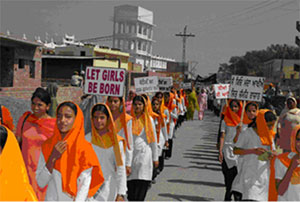 CHANDIGARH, April 12: The Art of Living has launched a massive campaign to end female foeticide in India in association with the United Nations Population Fund (UNFPA).
CHANDIGARH, April 12: The Art of Living has launched a massive campaign to end female foeticide in India in association with the United Nations Population Fund (UNFPA).
As part of the campaign, Swamis of the Art of Living are on a series of yatras in Punjab to educate the masses against the practice of sex selection. Punjab is among the worst affected states in the country with a heavily skewed sex ratio of 798 girls per 1,000 boys.
Called Beti Sneh Sanjivani Yatras, the campaign is being supported by UNFPA, the Punjab government, NGOs such as Punarjyot and Sembramky Environmental Management Ltd. Students from different institutions and religious leaders of different faiths across the state are also backing this effort and participating in good numbers.
"Representatives of the UNFPA have been present during the yatras. In all, about 50 organisations that are in network with the Voluntary Health Association of Punjab (VHAP) are participating in the yatras," said Anish Dua, co-ordinator of the campaign.
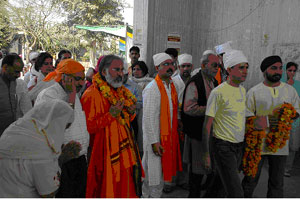 It is evident from people's reaction that spiritual leaders have a deep impact on such social issues. "The idea is to reach out to people and change their mindset about this social evil through the power of love. We are taking the message against sex selection to the people of Punjab," Dua adds.
It is evident from people's reaction that spiritual leaders have a deep impact on such social issues. "The idea is to reach out to people and change their mindset about this social evil through the power of love. We are taking the message against sex selection to the people of Punjab," Dua adds.
The yatras, which began on March 26 from Talwandi Saabo in Batinda district, will culminate on April 13 in Anandpur Sahib in Fatehgarh Sahib after passing through 17 stations in six districts of the state.
The yatras have been creating an awareness among people about the negative repercussions of the practice of sex selection through educational talks, satsangs (spiritual gatherings) and meditation. Thousands of locals joined the yatras in all stations covered so far.
These yatras are being conducted as a part of the campaign jointly launched by the Art of Living and UNFPA last year.
The founder of the Art of Living Sri Sri Ravi Shankar has been strongly advocating the need for educating people about such negative practices in society.
"Killing a cow is a most heinous sin but the sin committed by killing one scholar is equivalent to killing one hundred cows. Killing one saint is equivalent to killing one hundred scholars. And the killing of a girl child is equivalent to killing one hundred saints," he quotes from the Dharma Shastras.
Christians observe Easter; Pope says not to fear evil
ROME, April 8: Chritians across the globe observed Easter Sunday, marking the resurrection of Jesus Christ and symbolizing the victory of love over hatred, Pope Benedict tells devotees not to fear evil and death.
Pope Benedict led the devotees into the second Easter of his pontificate.
The 79-year-old Pope presided at an elaborate Easter Vigil in St Peter's Basilica on Saturday, the last event in a hectic week before Sunday's main Easter service in St. Peter's Square.
The ceremonies have commemorated Jesus Christ's suffering, death and resurrection, and mark the climax of the Christian calendar.
Hundreds of c Christian worshippers on Saturday night attended a ceremony of candle lighting at the Church of Nativity in the West Bank town of Bethlehem, believed to be Jesus' birthplace.
New Orleans marks Sri Sri Ravi Shankar Day; Mayor Presents Him with Keys To The City
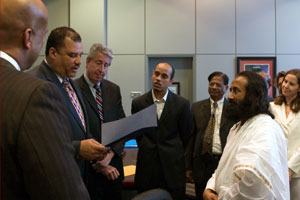 NEW ORLEANS, APRIL 4: Another city of the US dedicated a day to honour the founder of the Art of Living, Sri Sri Ravi Shankar. The New Orleans City Council ALSO declared April 3 as 'His Holiness Sri Sri Ravi Shankar Day' in New Orleans. It also presented Sri Sri with a proclamation in recognition of his distinguished international service to humanity.
NEW ORLEANS, APRIL 4: Another city of the US dedicated a day to honour the founder of the Art of Living, Sri Sri Ravi Shankar. The New Orleans City Council ALSO declared April 3 as 'His Holiness Sri Sri Ravi Shankar Day' in New Orleans. It also presented Sri Sri with a proclamation in recognition of his distinguished international service to humanity.
As a mark of respect, the renowned spiritual leader and humanitarian was presented with the 'keys to the city' by Mayor Ray Nagin at City Hall on Wednesday. "We will begin to work closely with His Holiness (Sri Sri) and his organizations to identify the specific set of needs for the New Orleans communities," the mayor said.
Louisiana Governor Kathleen Babineaux Blanco officially declared March 25-30, 2007 as 'Human Values Week' in honour of the national Uplift Human Values campaign initiated by The Art of Living.
More than 1,500 people attended Sri Sri's talk at McAllister Auditorium at Tulane University where he also led a guided meditation. This was Sri Sri's first visit to the city, where hundreds of his volunteers have been conducting trauma relief programmes for the survivors of the Hurricane Katrina.
New Orleans was the fifth stop on Sri Sri's six-city tour of the US, which kicked off with a gala at the John F Kennedy Center for the Performing Arts in Washington, DC on March 28.
Last week, the city of Washington had marked March 28, 2007 as Sri Sri Ravi Shankar Day and March 25-30, 2007, as 'Human Values Week'.
US celebrates Silver Jubilee of Art of Living
Sri Sri call to nurture stress free society
By Deepak Arora
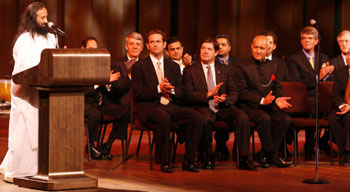 WASHINGTON DC: The spiritual Guru and Art of Living founder, Sri Sri Ravi Shakar, has stressed on the need to nurture human values so that “we can have a stress-free, violence-free society”.
WASHINGTON DC: The spiritual Guru and Art of Living founder, Sri Sri Ravi Shakar, has stressed on the need to nurture human values so that “we can have a stress-free, violence-free society”.
Launching the Art of Living’s silver jubilee with a gala event at Washington DC's Kennedy Center for Performing Arts on Wednesday evening (March 29), Sri Sri urged Americans to work towards the dual goal of protecting "our environment... and human values of compassion, friendliness, cooperation, and a sense of belonging to each other."
"This will protect our minds, our hearts -- the soul of the planet. These human values need to be nurtured so we can have a stress-free, violence-free society," he said in the simply, folksy way that has become his trademark.
During his current 11-day US tour, the spiritual Guru also travels to several cities in New York, Utah and California. He received overwhelming response during his stop over in Salt Lake City, Boise, Kansas City, New Orleans, Cornell and New York.
The trip is part of his new "Stress Free, Violence Free America" campaign, which is part of a 25th anniversary celebration of the Art of Living.
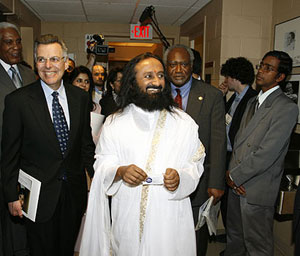 Capitol’s movers and shakers, including Senators and Congressmen, diplomats and scientists, attended the gala event at Kennedy Center to honour a Guru who has developed a vast following in the US, cutting across race and religion.
Capitol’s movers and shakers, including Senators and Congressmen, diplomats and scientists, attended the gala event at Kennedy Center to honour a Guru who has developed a vast following in the US, cutting across race and religion.
A highlight of the evening was the formal unveiling of Sri Sri's proposed Universal Declaration of Human Values.
This Declaration provides a pragmatic vision for the world community, representing a road map to foster understanding and harmonious coexistence among different peoples and cultures.
Drafted in the form of a proposed resolution of the United Nations General Assembly, the Declaration emphasizes the urgent need to rekindle human values in society in order to resolve the serious challenges facing the world today.
Two special proclamations were made in honour of the Kennedy Centre event: March 28, 2007, was proclaimed "Sri Sri Ravi Shankar Day in Washington, D.C.;" and March 25 to 30, 2007, was proclaimed "Human Values Week in Washington, D.C."
A number of prominent members of Congress addressed the gathering, praising the work of the Foundation and its founder, including Sen. Joseph R. Biden; Rep. Jan Schakowsky; Rep. Joe Wilson; Rep. Danny Davis; Sen. Joseph Crowley; and Rep. Luis Gutierrez.
Also on stage with Sri Sri were a number of ambassadors, judges and prominent business leaders.
"The Art of Living Foundation is one of India's stars. It has an incredible following that cuts through all religions, cultures and backgrounds -- a very, very difficult thing to do in today’s world. If there's anything we need today, it's tolerance," Senator Biden, a presidential candidate with a large Indian-American following, said.
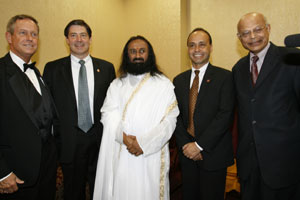 He praised the Foundation in particular for its important work promoting peace, combating drug addiction, and empowering youth.
He praised the Foundation in particular for its important work promoting peace, combating drug addiction, and empowering youth.
Vijay K. Nambiar, Chief of Staff to the United Nations Secretary-General, Ban Ki-Moon, also addressed the gathering, bringing a message on behalf of the Secretary-General.
In his message, Ban Ki-Moon stated, ''It is reassuring to know that you – a diverse assembly of origins and cultures – have gathered to celebrate your commitment to global harmony and peaceful coexistence. The values you champion, including non-violence, compassion and the sanctity of all life, go to the heart of what the United Nations stands for.''
Founder and president of the National Veterans Foundation (NVF) Floyd "Shad" Meshad, presented Sri Sri with an award honoring his outstanding service to returning veterans and their families. Meshad, who recently participated in Sri Sri's 'Project Welcome Home Troops' Course, said, "Anything we can do to bring our troops peace of mind, and let them come back and reintegrate into society, is worth its weight in gold."
Just prior to the event, Sri Sri hosted a reception at the Kennedy Center, which was attended by over one thousand dignitaries and prominent leaders of society. The evening concluded a powerful with guided meditation by Sri Sri.
The response of the people of Washington was so overwhelming that organisers had to turn down many requests for tickets from embassies, congressional leaders and other dignitaries as the hall at the John F Kennedy Center for Performing Arts was at capacity.
 On Friday at the Marriott University Park Hotel in Salt Lake City, Utah, over 600 people joined Sri Sri joined him in a "peace meditation."
On Friday at the Marriott University Park Hotel in Salt Lake City, Utah, over 600 people joined Sri Sri joined him in a "peace meditation."
Speaking on the occasion, Nobel Laureate Myron Scholes, who is a Stanford University economist, said Sri Sri’s rhythmic breathing technique reduces stress and anger, which then helps people learn, "and from learning we can give".
Sri Sri conferred doctorate
 BANGALORE, March 25: Renowned spiritual leader and founder of the Art of Living Sri Sri Ravi Shankar was on Saturday conferred the Honorary Doctorate of Science by Rajiv Gandhi University of Health Sciences.
BANGALORE, March 25: Renowned spiritual leader and founder of the Art of Living Sri Sri Ravi Shankar was on Saturday conferred the Honorary Doctorate of Science by Rajiv Gandhi University of Health Sciences.
The degree was conferred during the ninth annual convocation of the India's largest medical university. Sri Sri has added a holistic dimension to healthcare by reviving ancient healing techniques and practices and presented them in a way that is suitable for modern lifestyles.
In 1982, he cognized the Sudarshan Kriya, a profound breathing technique that releases stress and toxins at the physical, mental and emotional level, promoting better overall health.
While addressing the convocation, where he was the chief guest, Sri Sri emphasized the need to tap the potential of traditional medicine system such as Ayurveda.
"The 21st century is the century for holistic medicine
and India is only country which has the necessary knowledge base to play a decisive role. The government should tie up with foreign universities to make Ayurveda a recognized science. It is said that Ayurveda is not being accepted in the Western world the way Chinese medicines are though Ayurveda is time-tested," he said.
Sri Sri also expressed grave concern over unethical practices that have crept into the medical profession. "It's unfortunate that illegal organ trading and female foeticide have come into this noble profession. The responsibility to check such malpractices is on you," he told the young doctors who have just stepped into the profession.
Indian leaders pledge to end caste discrimination;
Adopt 7-point action plan to end untouchability
By Deepak Arora
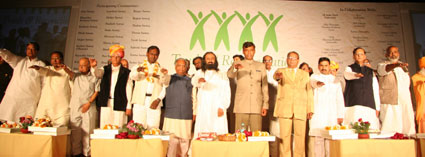 |
| Left to Right: Bijendra Munshi of Gujjar Samaj, Ram Nagina of
Bhumihar Brahmin amaj, KK Jajodia, Hari Khoday of Kshatriya
Samaj, Udit Raj, President, Indian Justice Party, Ramdas Agarwal of All India Vaishya Federation, Poojya Sri Sri Ravi Shankarji, Ram Chander Paswan of Paswan Samaj, Dr Sonpal Sumanaskar of Chamaar Samaj, Fateh Singh of Kohli Samaj, Bindeshwar Pathak, founder, Sulabh International and Sanjay Paswan of Paswan Samaj taking the pledge to implement a seven-point action plan to fight caste divisions and
discrimination. |
NEW DELHI, March 9: In a landmark beginning, Dalits and caste Hindus have decided to end the social evils of untouchability and caste discrimination.
At the historic "Truth & Reconciliation Conference", initiated by spiritual Guru, Sri Sri Ravi Shankar, a large number of Dalit and caste Hindu leaders pledged and adopted a 7- point action plan to end the social evils of untouchability and discrimination and spread the message of reconciliation to every corner of India.
The 7-point action plan focuses on ensuring temple entry for Dalits, organising collective celebrations including community feasts, abolition of the practice of keeping separate utensils for Dalits, empowerment of women from economically weaker sections, providing educational facilities especially to weaker sections, providing spiritual and religious education to Dalit children and ensuring equality and justice for all.
As a symbolic implementation of the plan, the leaders partook in a community feast or samuhik priti bhoj.
Addressing the conference, which was attended by over 5,000 people including leaders of about 25 communities, Sri Sri said, “We need to make people realise that discrimination is not sanctioned by religion. Every Hindu should be educated about the fact that many of the sacred texts he or she reads were written by Dalits.”
“It’s time to move forward and not to reel in past mistakes. The anger of the past should not engulf us and divide the country. Fear and the communication gap between communities are what is keeping us apart. We must accept reality and reconcile the differences,” he said.
Stating that many organizations, that do not see eye-to-eye, have come together for the first time at the conference, he said, “What we have started today will resonate across the country and unite the people. When leaders come together and take a vow, the people will follow them. My main concern is how to bring people together. This is not about one religion only. I want to bring all communities together on one platform.”
Regretting that despite several legislations, caste discrimination still prevails in rural India, the spiritual Guru said that only a change of heart and mind and a better understanding among communities will bring about social equality.
“The spirit of co-operation and reconciliation should percolate to the grassroots,” he said. “It’s not only Dalits who are fighting for their rights; there are thousands of committed soldiers of justice and equality from the upper castes who are working for the betterment of the Dalits,” he added.
Several leaders from the participating communities lauded Sri Sri for his endeavour to bring the communities together through this historic conference.
“I have been working for several years in this direction. Now I have full confidence that with Sri Sri's blessings and leadership, my efforts will get new vigour and inspiration,” said Dr Bindeshwar Pathak, founder of Sulabh International Social Service Organisation.
Dalit leader and president of Indian Justice Party, Udit Raj, welcomed the initiatives taken by Sri Sri and added that leaders of other communities must contribute to the cause of Dalit upliftment.
“If caste discrimination has to be eliminated, Dalits have to be integrated in all streams of society. The posts of the head of maths, especially the maths of Shankaracharyas should be filled by priests from every caste on a rotation basis,” he said.
Other leaders who attended the conference included Dalit leader Sanjay Paswan; Bijendra Singh of the Jat Samaj; Ms Sabina Srivastav of All India Kayasta Samaj; Bal Kishan Mahaar of Valmiki Samaj; president of Akhil Bharatiya Bhumihar Brahman Ram Nagina Singh; Fateh Singh of Koli Samaj; Ram Babu Arya of the the Akhil Bharatiya Naayee Mahasabha, President of the Kshatriya Samaj, V S Chauhan and Veer Kunwar Singh of Akhil Bhartiya Gujjar Sanskriti Shodh Sansthan.
The conference also featured a special exhibition to highlight the contributions of the Dalit Maharishis in Hindu literature. Notable examples would be of two epics that are revered by all - the Mahabharata and the Ramayana, which were written by the Dalit Maharishis Vyas and Valmiki respectively.
Sri Sri initiates steps to bring Dalits, caste Hindus together
By Deepak Arora
 NEW DELHI, March 7: Spiritual guru Sri Sri Ravi Shankar has initiated a process to bring about reconciliation between Dalits and upper caste Hindus.
NEW DELHI, March 7: Spiritual guru Sri Sri Ravi Shankar has initiated a process to bring about reconciliation between Dalits and upper caste Hindus.
As part of the initiative, Art of Living (AOL) hosts a historic conference here Friday where leaders from both communities will come together to reiterate their commitment towards ending social discrimination.
Named 'Truth and Reconciliation', the meet will be held at Pragati Maidan, according to Sangeeta Anand, a spokesperson.
It will see the adoption of a seven-point action plan that will focus on ensuring temple entry for Dalits, organising collective celebrations including community feasts, abolition of the practice of keeping separate utensils for Dalits and providing spiritual and religious education to Dalit children.
Over 5,000 people from at least 25 communities are likely to attend the conference, said the spokesperson.
Sri Sri Ravi Shankar said: "Historically Dalits were on par with caste Hindus. We need to make the present generation aware of this truth. The only solution to the problem of social discrimination is to educate people and make them realise that caste by birth is not sanctioned by religion."
The spiritual guru says: "The current generation of upper castes is not exposed to the enormous contribution of the Dalits to Hindu religious literature. The conference will go a long way in clearing many misunderstandings between the communities."
Christmas for All
By Dominic Emmanuel
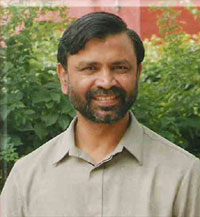 Angels announced the birth of Jesus to the shepherds in the fields, “Glory to God in the Highest and on earth Peace” (Luke, 2:14). The world certainly rejoiced at the Saviour’s birth. Strangely though, for a section of people this birth of Lord Jesus was no ‘good news’.
Angels announced the birth of Jesus to the shepherds in the fields, “Glory to God in the Highest and on earth Peace” (Luke, 2:14). The world certainly rejoiced at the Saviour’s birth. Strangely though, for a section of people this birth of Lord Jesus was no ‘good news’.
King Herod, when he learnt from the three wise men of the East that a new King of the Jews was born, “ordered all the newborns under the age of two to be put to death” (Mt., 2: 16). Here history was being repeated, for Pharaoh, fearing Moses and King Kansa, fearing the birth of Lord Krishna, had tried similar tricks earlier though both Moses and Lord Krishna had come out victorious from the cruel hands of their enemies. For the parents of all those innocents killed at the hands of Herod, the birth of Lord Jesus, however, was ‘bad news’.
In the case of Child Jesus an angel of the Lord appeared to Joseph in a dream saying, “Arise, take the young Child and His mother, flee to Egypt, and stay there until I bring you word; for Herod will seek the young Child to destroy Him” (Mt., 2:13). King Herod can certainly not be forgiven for his brutal act against the newborn babes though one can understand his own compulsions for doing that.
In our own times, however, one wonders what the compulsions of those people are, who get rid of the yet unborn children, particularly female babies, before they can ever see the light of day. Is dowry the issue? Or is it the mindset that only a male child can carry the family tree forward? Or is the lack of material resources to support a child the matter? If we judge Herod to have been a cruel man, how shall we judge ourselves? And how will God judge us?
Rabindranath Tagore once wrote, “Every child comes with the message that God is not yet discouraged of man”. The birth of Jesus is for the unborn too, who have not only a right to life but also to the Love that Christmas signifies. Can the birth of Jesus remove all insecurity from our hearts more particularly insecurity caused by the sheer expectation of a girl child?
Ramadoss rubbishes Baba Ramdev's claims
NEW DELHI, Dec 21: Union Health Minister Anbumani Ramadoss today rubbished the claims made by yoga guru Baba Ramdev that yoga can cure AIDS, saying such things which are not scientifically and clinically validated should not be propagated.
"What he has been saying is rubbish. I have lots of appreciation of what he is doing. We support him on the yoga front. But we are not with him when he propagates claims that are not scientifically and clinically validated," Ramadoss told newsmen at an informal interaction here.
Ramdev had claimed that his institute will "prove through clinical tests that yoga can cure AIDS" and said he has received notices from the Center and he is not afraid about getting them because he is telling the truth.
Ramadoss said he was not aware about the notice sent to Ramdev for making such claims on curing diseases.
"I am not aware about the notice. My department may have done so. But they (Department of Ayush) have sent similar notices to others too," Ramadoss said adding they have no problem when he claims of curing other diseases.
"It has been scientifically-proven that yoga helps in reducing diabetes, arthritis and stress-related problems. But not cancer and AIDS," he said.
"We are willing to work with him if he could prove that he could find a cure for HIV. But not without scientifically-backed facts."
The minister said they are planning to amend the Drugs and Magic Act, which will also cover treatment module. "We have sent it for approval to the cabinet," he said.
Sri
Sri's call of peace in Africa marks the end of Satyagraha 100
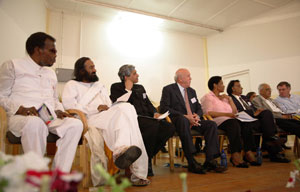 |
From
left to right: Former cabinet minsiter Buthelezi, His Holiness
Sri Sri Ravi Shankar, deputy high commissioner of India in
South Africa, former President De Klerk, Deputy President
Phumzile Mlamba-Ngcuka, Gandhian Mewa Ramgobin and former
political prisoner Ahmed Kathrada at the at the function held
in Robben Island to mark the 100th years of Mahatma Gandhi's
Satyagraha in South Africa.
|
ROBBEN
ISLAND (South Africa), Dec 18: His Holiness Sri Sri Ravi Shankar's
call for a wave of peace in Africa marked the culmination of South
Africa's year-long Satyagraha 100 celebrations on Sunday. Sri
Sri was the "Honorary Guest from India" at the function
held in Robben Island -- where Nelson Mandela was formerly imprisoned
-- to mark the 100th years of Mahatma Gandhi's Satyagraha in South
Africa.
The
event was attended by Deputy President of South Africa Phumzile
Mlambo-Ngcuka, Deputy Speaker of Parliament Glen Mahlangu, former
president of South Africa De Klerk, cabinet ministers, members
of Parliament and the diplomatic corps.
Former
political prisoners including Ahmed Kathrada, who was sentenced
with Mandela to life imprisonment, also attended the event. Satyagraha
100 marks the historical milestone for the adoption of the Gandhian
Trinity which was the cornerstone of the new South African democracy.
The
Satyagraha centenary celebrations were hosted by the Phoenix Settlement
Trust, a national government integrated project in Kwa Zulu Natal,
which serves as an interpretation centre by translating the Gandhian
philosophy into ethnic languages and fostering the culture in
the settlement.
Hailing
the peaceful transformation in South Africa as a model for the
rest of Africa, Sri Sri said South Africa can start a wave that
can bring peace in Africa. Emphasising the need to address the
problems that youth and women face in South Africa, he said, "Unless
and until we attend to these problems, we will just be shifting
the situation from governmental oppression to domestic oppression."
Sri
Sri said Africa has very old and evolved philosophies such as
ubuntu which means "I am because you are. You are because
I am". "This was a heartfelt cry of an evolved human
being which recognises that there is but one divinity," he
said, adding the philosophy is identical to the ancient ideal
of Vasudhaiva Kutumbakam.
"To
eliminate terrorism, we need to spiritualise politics, socialise
business and secularise religion," he said. Stating that
Africa's wisdom needs to be shared with the world, he emphasised
the need to amalgamate the ancient values of ubuntu and Gandhian
Trinity with modern progress.
Later in the evening, Sri Sri took part in a multicultural provincial
event hosted by Premier of the Western Cape Ebrahim Rassool. On
Saturday, Sri Sri visited the Phoenix Settlement Trust in Durban
and lit light the "light of hope" for peace in Africa
at Sarvodaya, Ghandiji's erstwhile ashram.
Speaking
on the occasion, Sri Sri said that satya means truth and agraha
means insistence, thus satyagraha means insistence on truth --
yet without getting angry or acting in anger. He noted that it
is mostly injustice that provokes actions that are taken in anger
and which are always regretted later. "With spirituality,
anger can be channelled and actions taken with awareness so that
the fruit of such action will be palatable," he said. He
said that the Ghandian trinity values of satyagraha, amihsa and
sarvodaya cannot exist in isolation or apart from each other.
Sri
Sri, who was currently on a five-day tour of the African continent,
also met with Justice of the Constitutional Court at Constitutional
Hill, the home of the Constitutional Court, protector of the basic
human rights and freedom, apart from attending several events
hosted by his devotees.
Sri
Sri condemns violence, calls for peaceful means of protest
BANGALORE,
Dec 1: His Holiness Sri Sri Ravi Shankar has expressed deep regret
over the spread of violent protests in different parts of the
country following the reported desecration of a statue of B R
Ambedkar in Kanpur.
In
a statement issued from Kochi, Sri Sri appealed to Dalits and
youths from all communities to keep calm and not damage public
properties in a fit of anger.
"Let
us all work together to eradicate untouchability. People shouldn't
get carried away by foolish act of a few and damage the infrastructure
of our country which will affect the poor people," Sri Sri
said.
"The
towering personality of Ambedkar and his commendable contribution
to the country will shine forever and continue to inspire everyone
to fight for justice," he added.
Sri
Sri urged people to adopt peaceful and non-violent ways of protest
against injustice and corruption.
European
Parliament hosts corporate event of Art of Living
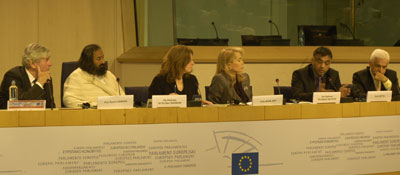 BRUSSELS,
Nov 11: Corporate Culture and Spirituality 2006, the calendar
corporate event of the Art of Living, was inaugurated at the European
Parliament in Brussels by His Holiness Sri Sri Ravi Shankar on
Friday. This is for the first time that such an event is being
held at the European Parliament.
BRUSSELS,
Nov 11: Corporate Culture and Spirituality 2006, the calendar
corporate event of the Art of Living, was inaugurated at the European
Parliament in Brussels by His Holiness Sri Sri Ravi Shankar on
Friday. This is for the first time that such an event is being
held at the European Parliament.
The
inaugural ceremony was attended by among others Her Highness the
Begum Aga Khan, Belgian Senator John Marie Edeker, Member of European
Parliament Erika Mann, former prime minister of Netherlands Rudd
Lubbers, ace musician Peter Mafay and many other members of the
European Parliament.
In
his inaugural speech, Sri Sri said ethics is the one common thread
that unites all fields of life. "Devoid of spirituality,
religion breeds terrorism, business breeds greed and exploitation,
politics breeds corruption and sports and entertainment turns
into stress." Terming it as one medicine that takes care
of all illnesses, Sri Sri said, "Spirituality will liberalise
politics, socialise business and secularise religion."
"If
business can ensure that values are maintained in society, then
nothing else can take it away. Ethical values in business can
help people become socially responsible," he concluded.
Impressed by the success of the symposium, the European Parliament
has offered to host the symposium next year too.
On
the occasion, the first Ethics Award for Global Governance, instituted
by Corporate Culture and Spirituality, was presented to the Tata
Group. Mr T R Doongarji, Managing Director, Tata Services received
the award on behalf of Tata Group
Gita
is new mantra for US businesses
WASHINGTON,
Oct 25: Big businessess in the United States are embracing Indian
philosophy in a significant but sometimes quirky new trend. A
recent whirlwind East Coast tour by Swami Parthasarathy, one of
India's best-selling authors on Vedanta, was just one small manifestation
of the new trend, according to BusinessWeek magazine.
Suddenly,
phrases from ancient Hindu texts such as the Bhagavad Gita are
popping up in management tomes and on websites of consultants,
while top business schools have introduced "self-mastery"
classes that use Indian methods to help managers boost their leadership
skills and find inner peace in lives dominated by work.
More
important, India-born strategists also are helping transform corporations.
Academics and consultants such as C.K. Prahalad, Ram Charan, and
Vijay Govindrajan are among the world's hottest business gurus,
Pete Engardio and Jena McGregor write in the Oct 30 issue of the
publication.
About
10 percent of professors at places such as Harvard Business School,
Northwestern's Kellogg School of Business and the University of
Michigan's Ross School of Business are of Indian descent -- far
higher than other ethnic groups.
"When
senior executives come to Kellogg, Wharton, Harvard, or [Dartmouth's]
Tuck, they are exposed to Indian values that are reflected in
the way we think and articulate," the weekly quotes Dipak
C. Jain, dean of the Kellogg School as saying.
Indian
theorists, of course, have a wide range of backgrounds and philosophies.
But many of the most influential acknowledge that common themes
pervade their work.
One
is the conviction that executives should be motivated by a broader
purpose than money. Another is the belief that companies should
take a more holistic approach to business - one that takes into
account the needs of shareholders, employees, customers, society
and the environment.
Some
can even foresee the development of a management theory that replaces
the shareholder-driven agenda with a more stakeholder-focused
approach.
"The
best way to describe it is inclusive capitalism," the magazine
says, citing Prahalad, a consultant and University of Michigan
professor who ranked third in a recent Times of London poll about
the world's most influential business thinkers. "It's the
idea that corporations can simultaneously create value and social
justice."
You
might also call it Karma Capitalism. For both organisations and
individuals, it's a gentler, more empathetic ethos that resonates
in the post-tech-bubble, post-Enron zeitgeist.
These
days, concepts such as "emotional intelligence" and
"servant leadership" are in vogue. Where once corporate
philanthropy was an obligation, these days it's fast becoming
viewed as a competitive advantage for attracting and retaining
top talent.
Where
the rallying cry in the 1980s and 1990s may have been "greed
is good", today it's becoming "green is good".
And
while it used to be hip in management circles to quote from the
sixth century BC Chinese classic The Art of War, the trendy ancient
Eastern text today is the more introspective Bhagavad Gita, the
Businessweek said.
Earlier
this year, a manager at Sprint Nextel Corp. penned the inevitable
how-to guide: the key message of "Bhagavad Gita on Effective
Leadership" is that enlightened leaders should master any
impulses or emotions that cloud sound judgment. Good leaders are
selfless, take initiative, and focus on their duty rather than
obsessing over outcomes or financial gain, the weekly said.
"The
key point," it quotes Ram Charan, a coach to CEOs such as
General Electric Co.'s Jeffrey R. Immelt, as saying "is to
put purpose before self. This is absolutely applicable to corporate
leadership today".
Art
of Living to organize special camps for chikungunya patients
The Sudarshan Kriya results in faster recovery, acts as preventive
and curative measure
BANGALORE
, Oct 14: Encouraged by the efficacy of its techniques in treating
people with symptoms of chikungunya, the Art of Living has decided
to start special camps all over the country to cater to people
suffering from the disease. The camp will offer yoga, pranayama
and meditation apart from the Sudarshan Kriya, the unique breathing
technique taught in the Art of Living workshop.
"We have been studying the effects of our techniques on people
with symptoms of chikungunya for the last few weeks. It has been
observed that people who regularly practise the Sudarshan Kriya,
pranayama and meditation are not only less prone to the disease
but also recover faster even if they get an attack," said
Swami Sadyojatah of the Art of Living.
"Several patients in different parts of India have reported
faster recovery from the disease after undergoing the Art of Living
workshop, which comprises yoga, pranayama and meditation. This
shows that our techniques work not only as preventive but also
as a curative measure," added Swami Sadyojatah.
Concurs Dr Renuka Dugani, a practising physician from Hubli, one
of the worst effected areas in Karnataka. "Many of my patients
showed remarkable recovery soon after they underwent the Art of
Living workshop. The improvements are so apparent that now I prescribe
the workshop to every patient that comes to me with symptoms of
chikungunya," she said.
"Soon after I did the Sudarshan Kriya, my condition improved
considerably," testifies Dr Kasturi of Hubli, who was diagnosed
with chikungunya three weeks ago. "Despite all the symptoms,
I was able to attend the workshop because I started feeling better
from the first day itself," she added. "All the symptoms
vanished within four days of practicing the Sudarshan Kriya,"
said Vinay Bhardwaj, 24, of Malur. "We have offered the workshop
in affected areas all over the country.
In Karnataka, we have catered to many patients the worst affected
districts such as Hubli, Kolar and Tumkur," said Swami Sadyojatah.
Explaining how yoga, pranayama, meditation and Sudarshan Kriya
help to cure the disease, yogacharya Dinesh Kashikar said, "Pranayama
is a very effective antidote for fever as it cools down the body
and restores the balance. Yoga asanas loosen up the joints and
provide relief from body pain, which are the dominant symptoms
of chikungunya."
"The Sudarshan Kriya and accompanying meditations strengthen
the immune system and allow the body to fight back," he explained.
The unique rhythmic breathing technique designed by His Holiness
Sri Sri Ravi Shankar has helped millions of people across the
globe successfully manage the stress, get rid of a number of medical
problems including the serious ailments such as depression, panic
attacks, diabetes, heart problems, cancer and AIDS, besides leading
happier lives.
Pope
says he's sorry, speech didn't reflect personal opinion
CASTEL
CANDOLFO (Italy), Sept 17: Pope Benedict XVI said on Sunday he
was "deeply sorry" about the angry reaction sparked
by his speech about Islam and holy war and said the text did not
reflect his personal opinion.
"These
(words) were in fact a quotation from a medieval text which do
not in any way express my personal thought," Benedict told
pilgrims at his summer palace outside Rome. He noted that the
Vatican secretary of state yesterday had issued a statement trying
to explain his words, which Benedict had delivered Tuesday in
a speech during a pilgrimage to his native Germany.
"I
hope that this serves to appease hearts and to clarify the true
meaning of my address, which in its totality was and is an invitation
to frank and sincere dialogue, with great mutual respect."
Speaking
about his pilgrimage last week, he said, "At this time I
wish also to add that I am deeply sorry for reactions in some
countries to a few passages of my address at the University of
Regensburg, which were considered offensive to the sensibility
of Muslims."
"While
anger over the Pope`s (Regensburg) remarks is necessary, it shouldn`t
last long, because while he is the head of the Catholic church
in the world, many Europeans are not following (the church) so
what he said won`t influence them," Mohammed Mahdi Akef,
leader of the Muslim brotherhood in Egypt, told media persons.
In
an unusual step, the Vatican`s press office released translations
into English and French today of the Pope`s statement. Usually
the Sunday remarks, delivered in Italian, are not translated by
the Vatican.
Russian
President Vladimir Putin today urged world religious leaders to
show "responsibility and restraint" to avoid what he
called "extremes" in relations between faiths.
Benedict
looked relaxed when he greeted the pilgrims who were standing
in pouring rain in the palace courtyard. He smiled and said he
hoped it would be better weather on Wednesday for his general
audience when he planned to recount more of his pilgrimage to
the faithful.
Metal-detecting
wands were waved across visitors - heightened Vatican security
measures employed since September 11, 2001, terror attacks. But
in a sign of even more security following the furore over the
remarks, some pilgrims were patted down by Italian police, and
some metal-tipped umbrellas and bottles of liquid were confiscated
from faithful waiting to enter the courtyard.
Police
sharpshooters kept watch from a city hall balcony on the square
and other officers, dressed like tourists, filmed the crowd with
video cameras.
Italy`s
interior minister insisted that the tensions over Benedict`s remarks
among Muslims wouldn`t result in any significant security worries.
"I don`t believe that for Italy it`s a concern that will
rise," Giuliano Amato told Italian state radio. Amato noted
that suspected terrorist cells, under surveillance in Italy, were
considered to have their potential terrorist interest aimed "outside
of Italy."
But
Jordanian Muslims said that was not enough and called on the Pope
to personally apologise for his remarks. Indonesian President
Susilo Bambang Yudhoyono described Pope`s reference at the university
as "unwise and inappropriate," the Kompas daily reported.
Canadian
cities mark Sri Sri Ravi Shankar Day
By
Deepak Arora
MONTREAL,
SEPT 12: After Mongolia, it's now Canada's turn to be swept by
a wave of Indian spirituality with His Holiness Sri Sri Ravi Shankar's
visit to the country receiving a resounding welcome across the
nation. Two cities honoured Sri Sri by proclaiming the day of
his visit as 'His Holiness Sri Sri Ravi Shankar Day' and another
conferred him the honorary citizenship.
Thousands
of locals flocked to attend the one-day 'Discover...Success without
Stress' workshops conducted by Sri Sri and numerous government
officials received him in all the cities visited by him so far
as part of his 10-day 'One World Family' tour of Canada. The tour
began in Winnipeg on September 6.
Mayor
of the city of Edmonton Stephen Mandel declared September 7 as
'HH Sri Sri Ravi Shankar Day' while Mayor of Halifax Peter Kelly
proclaimed September 10 as 'HH Sri Sri Ravi Shankar Day'. In the
city of Calgary, Sri Sri was made an Honorary Citizen and awarded
the Centennial 2006 Medallian by the Legislative Assembly (the
provincial government).
He
was also conferred the 2006 International Peace Award by For the
Love of Children Society of Alberta. Lauding Sri Sri's contributions,
Senator Grant Mitchell said the Art of Living Foundation has been
helping the Canadian aboriginal community to combat the problems
of alcoholism and suicide.
Sri
Sri also addressed the opening session of the 'World's Religions
after September 11 Congress' in Montreal on Monday. During the
tour, he also met with Sri Lankan Tamils who are gravely concerned
about the situation in Sri Lanka.
Last
month, Sri Sri overwhelmed the people of Mongolia during his three-day
visit to the country where he was welcomed by several top leaders
including the President. Thousands of people attended his programmes
during the visit, with more than 10,000 people attending the Sudarshan
Kriya session conducted by him in Ulan Bator. Sri Sri was conferred
the highest civilian and military honour of Mongolia, 'The Pole
Star' for his "yeoman service to mankind".
Earlier
this month, Sri Sri was also conferred the honorary citizenship
of the city of Baltimore, USA, in recognition of his contribution
to the city and global peace.
Sri
Sri Ravishankar awarded Mongolia's highest civilian honour
 ULAN
BATOR, Aug 24: Art of Living founder Sri Sri Ravishankar was on
Thursday honoured with Mongolia's highest civilian award for his
contribution to Indo-Mongolian friendship through his foundation.
ULAN
BATOR, Aug 24: Art of Living founder Sri Sri Ravishankar was on
Thursday honoured with Mongolia's highest civilian award for his
contribution to Indo-Mongolian friendship through his foundation.
Mongolia`s
president N Enkhabayar bestowed the "Pole Star" upon
the guru at Soyombo Hall in the President`s office this afternoon.
The
spiritual guru is here on the official invitation of the Mongolian
government. His Art of Living Foundation has a huge following
in Mongolia with even the country's President and Prime Minister
being its ardent practitioners.
"I
feel honoured at being bestowed with this honour and I believe
it is not just the recognition of an individual but the recognition
of deep spiritual and historical relations that India and Mongolia
share," said Sri Sri Ravishankar after receiving the award
for his "Yeoman service to mankind".
According
to the President`s spokesperson, Tugsjargal Gandhi, very few people
had been accorded the rare honour till now.
"This
is the 800th year of the Mongolian state and we chose this year
to honour Sri Sri Ravishankar recognising his popularity and his
role in deepening the relationship between India and Mongolia,"
said Gandhi, chairperson of the Committee on Social Policy, education,
culture and science which accords the honour.
Saints
flay opposition to Vande Mataram
By Deepak Arora
NEW
DELHI, Aug 23: Several saints of India have expressed dismay over
certain sections of Muslim's opposition to singing the Vande Mataram,
the national song of India.
Saints, including Swami Dayanand Saraswati, Swami Chidanand Saraswati
and Sri Sri Ravi Shankar, have also instructed all Hindu religious
places and congregations to start singing the Vande Mataram.
In a statement they said, "Religious intolerance has to stop
somewhere. Today, it's Vande Mataram, tomorrow it could be refusing
to say 'Namaste' or seeking the removal of the saffron colour
from the national flag. This will harm the composite culture and
social fabric of India."
The saints also urged the Prime Minister not to ignore Hindu religious
leaders and interact with them as he often does with ulemas. They
called upon Muslim intellectuals to condemn the attempt to insult
the national song in the name of religion and urged the Prime
Minister not to give in to the obscure and fanatic interpretation
of religion.
43
Iraqis to teach Art of Living; Pledge to use knowledge to bring
peace in Iraq
BANGALORE,
JULY 23: A group of Iraqis completed a special one-month training
program in trauma relief at the Art of Living International Centre
in Bangalore on Friday. Thirty years of dictatorship, 20 years
of war and 10 years of embargo have left deep psychological and
emotional scars on the Iraqi people still hoping for peace. With
an increasing demand for the Art of Living Trauma Relief courses
in Iraq, this group is now ready to teach them in their country
and enhance the living conditions of the people suffering from
post-war trauma.
Hailing
from different parts of Iraq like Baghdad, Basra and Karbala,
the 43-strong Iraqi contingent comprised lawyers, government officers,
engineers, principals, journalists, political leaders and sports
personalities. As part of the intensive training program, they
took lessons in trauma relief techniques which include ancient
Indian breathing practices and the Sudarshan Kriya, a breathing
process taught by His Holiness Sri Sri Ravi Shankar.
"I
feel strong and empowered with the techniques learnt at the ashram,"
says Wafa, the first Iraqi Art of Living teacher from Baghdad.
"Life is still very difficult for us in Iraq. I wish to share
Sri Sri's knowledge with my brothers and sisters and bring relief
in Iraq," she says.
While
undergoing the Teacher's Training Program, many physical, mental
and emotional scars were healed. The participants experienced
that years of anxiety, fear pain had transformed to tranquillity.
The course also imparted interpersonal and leadership skills as
well as trauma counselling.
On
the last day of the training, His Holiness Sri Sri Ravi Shankar
blessed the Iraqis. "Now you not only belong to Iraq but
to India and the world as well," he said. "You are pillars
of knowledge and you have to work to bring peace to your country."
Many
have made this their aim. Mr Al Mosawi, head of the ruling Shia
Council in Baghdad, who is on his second visit to the ashram,
says, "I have brought with me delegates from Basra and Karbala
so that they can spread this peace and love back home." Mariam
Al Reyes, ex member of the parliament of Iraq, too pledged to
make a difference to her country and fellow countrymen.
Mawahib
Shaibani, who led the contingent, believes, "Sri Sri is building
bridges between estranged communities, providing people with tools
to reawaken tolerance, reconciliation and acceptance."
The
Art of Living volunteers have been working in Iraq since September
11, 2003 to alleviate the suffering and trauma of war among the
Iraqis. Around 5000 Iraqis have undergone the Art of Living trauma
relief program.
An
international non-governmental organization, the Art of Living
offers stress elimination and service programs across different
strata of society, around the world. Founded by His Holiness Sri
Sri Ravi Shankar, the foundation, established in over 145 countries,
has been recognized by several bodies like the United Nations.
Sri
Sri calls for collective effort to fight terrorism
BANGALORE,
July 12: Internationally revered spiritual and humanitarian leader
His Holiness Sri Sri Ravi Shankar has strongly condemned the serial
bombing in Mumbai.
In
a statement issued from Bay Area, US, he said, "The world
can no longer keep quiet at such violent acts of terrorism. Citizens,
religious institutions, NGOs and governments should now come together,
cutting across religious divides, to isolate the extremist elements
and fight terrorism." Sri Sri appealed for peace, prayer
and action.
Meanwhile,
the Art of Living is in touch with local authorities and is fully
geared up to provide any service required to bring Mumbai back
to normal. Hundreds of volunteers are ready to donate blood whenever
sounded by local hospitals. The Art of Living will also conduct
trauma relief once the authorities grants the go-ahead for such
camps.
Sivananda
Centre - Spreading Ancient Wisdom of Yoga
By
Deepak Arora
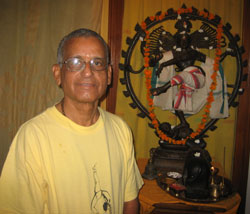 NEW
DELHI, June 14: "Anyone can practice Yoga. One doesn't need
special equipment or clothes. Just a small amount of space and
a strong desire for a healthier more fulfilled life," says
Yoga Siromani P C Kapoor, Director, Sivananda Yoga Vidanta Centre,
a leading Yoga centre in New Delhi, India.
NEW
DELHI, June 14: "Anyone can practice Yoga. One doesn't need
special equipment or clothes. Just a small amount of space and
a strong desire for a healthier more fulfilled life," says
Yoga Siromani P C Kapoor, Director, Sivananda Yoga Vidanta Centre,
a leading Yoga centre in New Delhi, India.
Says
Kapoor: "Yoga is a complete science of life that originated
in India thousands of years ago. It is the most comprehensive
system of personal development in the world, encompassing the
mind, body and the spirit."
One
may be drawn to Yoga as a way to keep oneself fit and to look
and feel good. One may, on the other hand come, seeking help or
relief for a specific complaint like tension or just for inner
peace, he says.
Sivananda
Yoga Vedanta Centres offer the space and the opportunity to enhance
the understanding and practice of Yoga. For new comers to Yoga,
Kapoor suggests the beginner's course. This course provides a
step-by-step introduction to the theory and practice of Yoga,
emphasizing proper exercise (Asanas), proper breathing (Pranayama)
and proper relaxation.
In
this course, he said, we teach 12 basic asanas, the Sun Salutation
(Surya Namaskar) and some basic pranayama.
Besides
beginner and advance courses, the centre also offers Yoga for
senior citizens and kids and expectant mothers. It also offers
workshops on Headstand, Inversions, Balancing, the Spine and Flexibility
and Shat Kriya. Besides Satsang or discourses, there are also
special courses on Meditation and Positive Thinking.
In
order to focus on certain aspects of Yoga, as well as to enhance
individual's practice, the Centre conducts regular workshops.
These workshops broaden understanding of the body, mind and spirit.
"They give you practical guidance on how Yoga in its broadest
sense can be used to cope with the stressful city life - a life
of competition and conflict, sense stimulation, confusion and
agitation."
The
Centre holds workshops on Stress Management, Thought Power, Prana,
Pranayama and the Astral Body, Cool head, balanced mind, Silencing
the mind, Yoga in daily life, Yogic cooking and fun cooking workshops.
Besides
New Delhi, the Centre's other branches are in Trivendrum in Kerala
and Madurai and Chennai in Tamil Nadu. Sivananda Yoga Vedanta
Ashrams and Centres also exist in Canada, the USA, Austria, France,
Germany, Israel, Spain, Switzerland, Uruguay and the UK.
The
Five Points of Yoga
By
Deepak Arora
 NEW
DELHI, June 13: The Yogi sees life as a triangle; the body undergoes
birth, growth, change, decay and death. The growth period reaches
a plateau at about 18 to 20 years. In the first years of life,
the "youthful period", the rate of cell rejuvenation
(anabolic) exceeds the rate of cell decay (catabolic). The body
then maintains equilibrium from the age of 20 until around 35,
when the decaying or catabolic process begins to take precedence.
The body machine starts its decline, resulting in "old age"
with its accompanying ills and despairs.
NEW
DELHI, June 13: The Yogi sees life as a triangle; the body undergoes
birth, growth, change, decay and death. The growth period reaches
a plateau at about 18 to 20 years. In the first years of life,
the "youthful period", the rate of cell rejuvenation
(anabolic) exceeds the rate of cell decay (catabolic). The body
then maintains equilibrium from the age of 20 until around 35,
when the decaying or catabolic process begins to take precedence.
The body machine starts its decline, resulting in "old age"
with its accompanying ills and despairs.
However,
the yogis say that were not born merely to be subject to pain,
suffering, disease and death. There is a far greater purpose to
life. But, the spiritual investigation of life's purpose requires
keen intellect and strong will, products of a healthy body and
mind.
For
this reason, the ancient sages developed an integral system to
retard the decaying process, and keep the physical and mental
faculties strong. This system of Yoga is simple, natural programme
involving five main principles:
1.
Proper Exercise
2. Proper Breathing
3. Proper Relaxation
4. Proper Diet
5. Positive Thinking and Meditation
Yoga
is life of self-discipline based on the tenets of "simple
living and high thinking". The body is seen as a temple or
vehicle for the soul, and has specific requirements which must
be fulfilled for it to function smoothly. The body is very much
like an automobile which too requires the five things: a lubricating
system, a battery, a cooling system, fuel and a responsible driver
behind the wheels.
Now
let us look at the human needs:
Proper
Exercise acts as a lubricating routine to the joints, muscles
ligaments, tendons, and other parts of the body by increasing
circulation and flexibility. Yogic Asanas are designed not only
to develop the body but also the mental faculties and the spiritual
capacities.
Proper
Breathing aids the body in connecting to its battery, the
solar plexus, where tremendous potential energy is stored. When
tapped through specific Yoga breathing techniques (Pranayama),
this energy is released for physical and mental rejuvenation.
The most important thing about good breathing is the Prana, or
subtle energy of the vital breath. Control of the Prana leads
to control of the mind. Pranayama thus means the control of the
vital energy. All diseases of the body can be destroyed at the
root by controlling and regulating the Prana.
Proper
Relaxation cools down the system, as does the radiator of
a car. When the body and mind are continually overworked, their
efficiency diminishes. Relaxation is Nature's way of recharging
the body.
Proper
Diet provides the correct fuel for the body. Optimum utilization
of food, air water, and sunlight is essential. The Yogic diet
is a vegetarian one, consisting of pure, simple, natural foods
which are easily digested and promote health. Simple meals aid
the digestion and assimilation of foods. Nutritional requirements
fall under five categories: protein, carbohydrates, minerals,
fats and vitamins. All natural foods (fruits, vegetables, seeds,
nuts and grains) have, in varying quantities, different proportions
of these essential nutrients. A healthy motto is: "eat to
live, not live to eat". A Yogic diet will help you attain
a high standard of health, keen intellect and serenity of mind.
Positive
Thinking and Meditation puts you in control. The intellect
is purified. The lower nature is brought under conscious control
through steadiness and concentration of mind.
Meditation
is an experience that cannot be described. One cannot learn to
meditate, anymore than one can learn to sleep. One falls into
both states. If you meditate for half an hour daily, you will
be able to face life with peace and spiritual strength. Meditation
is the most powerful mental and nerve tonic. It opens the door
to intuitive knowledge and realms of eternal bliss. The mind becomes
calm and steady.
Empower
all castes: Sri Sri
 NEW
DELHI, May 24: Expressing concern over the anti-quota agitation,
renowned spiritual leader and founder of the 'Art of Living' Sri
Sri Ravi Shankar has said caste- based reservation will not end
disparities in the society. Being
born in any particular caste should not be a curse, reverse discrimination
is not the way for justice, he said.
NEW
DELHI, May 24: Expressing concern over the anti-quota agitation,
renowned spiritual leader and founder of the 'Art of Living' Sri
Sri Ravi Shankar has said caste- based reservation will not end
disparities in the society. Being
born in any particular caste should not be a curse, reverse discrimination
is not the way for justice, he said.
Advocating
strong economic support for the downtrodden, the spiritual leader
said empowerment of all castes and communities is essential as
there are poor people in every community.
"We
need measures to unite the country and remove inequality at all
levels. Reservation on the basis of caste will not only divide
the country, but also hurt the self-esteem of our people,"
he said, calling upon politicians not to divide and discriminate
people in the name of caste or religion.
Sri
Sri addresses European Parliament
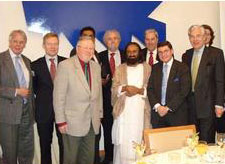 BRUSSELS,
May 9: His Holiness Sri Sri Ravi Shankar has emphasised the need
to uplift human values and the role of spirituality in combating
violence. Speaking about the problems in today's multicultural
society he pointed out the necessity to bring together diverse
cultures, traditions and religions.
BRUSSELS,
May 9: His Holiness Sri Sri Ravi Shankar has emphasised the need
to uplift human values and the role of spirituality in combating
violence. Speaking about the problems in today's multicultural
society he pointed out the necessity to bring together diverse
cultures, traditions and religions.
Addressing
the European Parliament in Brussels on Monday, Sri Sri stressed
on maintaining the balance between integrating and preserving
cultural and religious identities. The talk was attended by Members
of Parliament, diplomats, ambassadors and ministers. After taking
questions from them, he guided them into a 20-minute meditation.
Received
by the Chairman of the Committee on Foreign Affairs, Elmar Brok,
Sri Sri was given a standing ovation from the members and requests
to visit various EU countries came pouring in.
A reception held in his honour was attended by several Members
of Parliament including Mr Vincent Guerend, Membre de Cabinet;
Mr Jan Mulder, Alliance of Liberals and Democratic for Europe;
Mr Marianne Mikko, Socialist Group of the European Parliament
and Mr John Bowis, Member of European Parliament for London.
On
Tuesday, Sri Sri was received by former Prime Minister of Netherlands
Ruud Lubbers, the Mayor of Wasenaar, deputy mayor of Den Haag
and Rabbi Soetendorp. Mr Lubbers described his visit to the Art
of Living's Silver Jubilee celebrations in Bangalore as "life-transforming".
He said that he could never have believed that this could make
such a big difference.
"I
was called the 'No-Nonsense Prime Minister', and now I would like
to say Sri Sri is a 'No-Nonsense Guru'." Thanking Sri Sri,
Mr Lubbers said, "Please know, you have a lot of admirers
in Holland." He
will also address the Belgium Parliament and in the German Parliamentarian
Society next week.
Radha
Govind Boat Festival at Rishikesh
RISHIKESH,
April 29: Hundreds of devotees gathered from different places
at Madhuban on Saturday to celebrate the boat festival (Nauka
Vihar) of their Lordships Sri Sri Radha Govindji in the divine
association of Bhakti Yoga Swami ji maharaj.
Sri
Sri tours Far East, receives Taiwanese award
 Indian
spiritual guru Sri Sri Ravi Shankar drew huge crowds during
his recent tour of Southeast and East Asia and was also honoured
in Taiwan with an award for spreading his ideas on healthy living.
Ravi Shankar was on an 11-day tour of Singapore, Indonesia,
Hong Kong and Taiwan.
Indian
spiritual guru Sri Sri Ravi Shankar drew huge crowds during
his recent tour of Southeast and East Asia and was also honoured
in Taiwan with an award for spreading his ideas on healthy living.
Ravi Shankar was on an 11-day tour of Singapore, Indonesia,
Hong Kong and Taiwan.
He
was welcomed by top dignitaries in each of the countries he
visited, apart from drawing huge crowds in his public appearances.
In
Taiwan, he was awarded the "Fervent Global Love of Life
2006" award by the Cultural and Education Foundation of
Human Life. While honouring him, Chou Ta-Kuan, founder of the
organisation said: "Over 30 million people in over 151
countries have been blessed with love and health from Guruji.
Through his own actions, Sri Sri has shown us a way of life
that brings out human values in all of us, which is beyond religion."
Taiwanese
Vice-president Annette Lu Hsiu-Lien later received him in the
Presidential Palace.
Addressing
a large gathering in Hong Kong, Ravi Shankar expressed concern
over the alarming level of domestic violence in the country.
According to him, the city's rampant pursuit of material wealth
had taken its toll on happiness levels.
He
said: "I see a high stress level. There is social pressure,
competition and to cope with this, people need to find inner
strength. Material gain is okay, but not at the cost of your
happiness. You need to find a balance, inner peace and happiness.
I want to make people realise that life can be fun."
During
his visit to Indonesia, Ravi Shankar was accorded a warm welcome
in the Presidential Palace by President Susilo Bambang Yudhoyono.
While discussing concerns over the rising level of unemployment,
he offered to train batches of youths from Indonesia at the
Art of Living International Centre in Bangalore.
At
this, Yudhoyono suggested that the centre develop villages in
Merauke in Papua province, as youth there need immediate attention
following the recent incident of 32 Indonesians seeking political
asylum in Australia.
The
guru said the Art of Living Foundation, started by him, could
work with the Indonesian authorities in the areas of organic
farming as well since 75 percent of the population of both Indonesia
and India are farmers.
He
also stressed on the synergy between India and Indonesia in
the field of herbal medicine, given the latter's richness in
a variety of herbs. Several ministers including Jero Wacik,
state minister of culture and tourism, and Meutia Hatta Swasono,
state minister of women empowerment also called on Ravi Shankar.
Sri
Sri calls for collective action to end terror
By
Deepak Arora
Photographs:
Bharat Vig
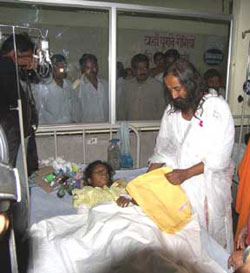 RISHIKESH,
March 13: The spiritual Guru, Sri Sri Ravi Shankar, has called
upon all communities to unitedly fight the scourge of terrorism.
Speaking to this correspondent at his kuteer in Rishikesh soon
after returning from the blast shaken temple town of Varanasi,
Sri Sri Ravi Shankar said "we have to take these challenges
with calm and fight it out collectively cutting across community,
religion and caste."
RISHIKESH,
March 13: The spiritual Guru, Sri Sri Ravi Shankar, has called
upon all communities to unitedly fight the scourge of terrorism.
Speaking to this correspondent at his kuteer in Rishikesh soon
after returning from the blast shaken temple town of Varanasi,
Sri Sri Ravi Shankar said "we have to take these challenges
with calm and fight it out collectively cutting across community,
religion and caste."
Sri
Sri had visited Varanasi on Friday along with Swami Dayanand
Saraswati, Swami Mahesh Giri of Guru Duttatreya Peeth and Swami
Succh Chetanaya to assuage the feelings of people shaken by
the recent serial blasts that had claimed over 20 lives and
injured 150 people.
Sri
Sri was the first spiritual leader to visit Varanasi after the
serial blasts rocked the temple town on Tuesday. The blast at
the Sankat Mochan temple and railway station had claimed over
20 lives and injured 150 people. He visited the Sankat Mochan
temple and prayed for those who had lost their lives in the
blast. He also visited the Government Hospital and two private
hospitals where the injured were being treated. A large crowd
had greeted the new age Guru when he reached Varanasi on a special
aircraft.
He
said the Art of Living will provide all the necessary support
to those injured. Soon after the blast, over 150 Art of Living
volunteers donated blood to treat the injured.
The
spiritual Guru, who is also founder of the Art of Living Foundation,
also appealed for calm and communal harmony. He also congratulated
the people of Varanasi for coming out in large numbers for the
prayers the very next day. "Bombs and guns can't shake
our faith nor can they instigate us away from the path of peace
and non-violence. Our protest is in the form of prayers and
compassion," he said.
Sri
Sri said the people want peace in the world and make life a
celebration. He called for measures to weed out fanaticism and
terrorism from the country by educating the people to a wider
vision of life and the world. "I urge all political parties
to set aside their political differences and take stringent
action to combat terrorism," said Sri Sri. He called upon
peace-loving people from all communities to work jointly to
identify people with tendency of violence and educate them.
Art
of Living Silver Jubilee
Living
exalted to the art of the sublime
By
Deepak Arora
 BANGALORE,
Feb 19: A sea of humanity from over 140 countries, including
India, gathered at the Jakkur Airfield and took part in the
Sudarshan Kriya Yoga and group meditation on the concluding
day of the three-day Art of Living (AOL) Foundation Silver Jubilee
celebrations.
BANGALORE,
Feb 19: A sea of humanity from over 140 countries, including
India, gathered at the Jakkur Airfield and took part in the
Sudarshan Kriya Yoga and group meditation on the concluding
day of the three-day Art of Living (AOL) Foundation Silver Jubilee
celebrations.
When
the largest-ever gathering of over 2 million people joined the
spiritual Guru Sri Sri Ravi Shankar in group mediation, a pin
drop silence fell on the Jakkur grounds. It showed power of
meditation and silence that eventually would lead to peace in
the world, a goal so cherished by Sri Sri Ravi Shankar. Religious
heads, dignitaries, heads of states, delegates from all over
the world, including India, joined him.
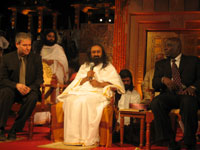 Sri
Sri Ravi Shankar spoke of the power of silence and the inner
joy it can bring. Just as the crowd slowly opened its collective
eyes, coming back, as if from a trance, the band struck a triumphant
note and ushered in the Indian President, Dr A.P.J. Abdul Kalam.
Sri
Sri Ravi Shankar spoke of the power of silence and the inner
joy it can bring. Just as the crowd slowly opened its collective
eyes, coming back, as if from a trance, the band struck a triumphant
note and ushered in the Indian President, Dr A.P.J. Abdul Kalam.
The
crowd spontaneously gave him a standing ovation. It was evident
that the President, an eminent nuclear scientist, has won many
a heart due to his simplicity and humility. The crowd stood
in disciplined attention to the tune of India's national anthem.
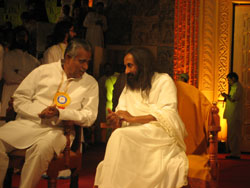 The
symbolic watering of a plant, Lakshmi Taru, by President Kalam,
Leader of the Opposition L.K. Advani, and other dignitaries
followed. Former Chief Justice of India, M.N. Venkatachalaiah,
welcoming the President, spoke of the power of the cultivated
breath that AOL has spread all over the world.
The
symbolic watering of a plant, Lakshmi Taru, by President Kalam,
Leader of the Opposition L.K. Advani, and other dignitaries
followed. Former Chief Justice of India, M.N. Venkatachalaiah,
welcoming the President, spoke of the power of the cultivated
breath that AOL has spread all over the world.
The
President released balloons as part of the valedictory function
of the three-day celebrations. Addressing over 2 million people,
who had gathered for the Silver Jubilee and and 50th birthday
celebrations of the spiritual guru, Dr Kalam said "Educating
people with a value system; transforming religion into spiritual
force and eradicating poverty will lead to a beautiful and prosperous
world."
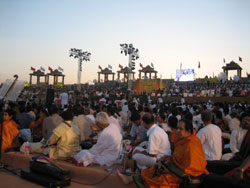 He
gave practical action points to implement his plan for the 2020
vision for India. He, in his usual disarming manner, made youngsters
repeat his message.
He
gave practical action points to implement his plan for the 2020
vision for India. He, in his usual disarming manner, made youngsters
repeat his message.
Such
a large gathering of humanity was a rare spectacle of the confluence
of celebration and spirituality. The line dividing the two,
in fact, blurred. "Spirituality is unconditional love and
a glimpse of the eternity," the spiritual guru had said
on the eve of the celebrations that kicked off on Friday at
Jakkur Flying club in Bangalore, South of India.
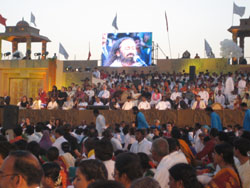 The
225-acre plot was a melting pot of geographical, racial, economical
and social boundaries. What happened was Upanishadic. It was
Vasudeva Kutumbakam: one world, one family, gathered from all
over the world to celebrate and share the joy of "unconditional
service to humanity".
The
225-acre plot was a melting pot of geographical, racial, economical
and social boundaries. What happened was Upanishadic. It was
Vasudeva Kutumbakam: one world, one family, gathered from all
over the world to celebrate and share the joy of "unconditional
service to humanity".
On
Friday, the opening day, the event began with the traditional
performance by Dollu Kunita and Pata Kunita followed by Vedic
chants by students of Ved Vigyan Mahavidyapeetha and an invocation
to Lord Ganapathi.
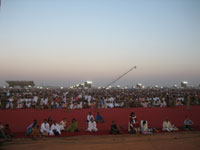 Sitting
on the stage were swamijis of different mutts, pontiffs of various
faiths and political dignitaries including Governor of Karnataka
T N Chaturvedi, Chief Minister H D Kumaraswamy, Deputy Chief
Minister B S Yediyurappa, Leader of the Opposition N Dharam
Singh and President of The Republic of Slovania Dr Janez Drnovsek,
besides a choir of around 3,800 musicians.
Sitting
on the stage were swamijis of different mutts, pontiffs of various
faiths and political dignitaries including Governor of Karnataka
T N Chaturvedi, Chief Minister H D Kumaraswamy, Deputy Chief
Minister B S Yediyurappa, Leader of the Opposition N Dharam
Singh and President of The Republic of Slovania Dr Janez Drnovsek,
besides a choir of around 3,800 musicians.
The
main event began with the lighting of the lamp by Sri Sri Ravishankar
and the political dignitaries.
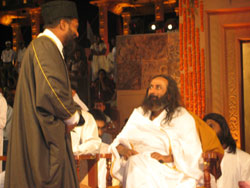 Governor
Chaturvedi lauded the efforts of Sri Sri Ravishankar and said
he had indeed fulfilled the prophecy of Vasudeva Kutumbakam.
Governor
Chaturvedi lauded the efforts of Sri Sri Ravishankar and said
he had indeed fulfilled the prophecy of Vasudeva Kutumbakam.
"His
message of fellowship, harmony and peace are highly commendable,
especially in times like these where the world is being torn
apart by divisive forces," he said.
Mr
Kumaraswamy in his chaste Kannada said the peace conference
should be a platform for peace initiatives in the world.
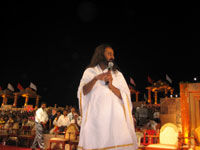 "It's
a matter of pride for Karnataka that two events of immense spiritual
importance like the Mahamastakabhishekam at Shravanabelagola
and the AoL's Peace Conference have taken place in the State,"
he said. At a time when the world is becoming extremely materialistic,
messages of peace and harmony are extremely important, the deputy
chief minister added.
"It's
a matter of pride for Karnataka that two events of immense spiritual
importance like the Mahamastakabhishekam at Shravanabelagola
and the AoL's Peace Conference have taken place in the State,"
he said. At a time when the world is becoming extremely materialistic,
messages of peace and harmony are extremely important, the deputy
chief minister added.
Sri
Sri Ravishankar and Mr Kumaraswamy also released the silver
jubilee souvenir of the Art of Living Foundation. Mr Yediyurappa
and the spiritual guru launched the 'Miracle credit card' -
a joint venture by the foundation and the Centurion Bank of
Punjab, in which the seva points collected will be converted
into cash and used for the education of the underserved children
in India.
Sri
Sri Ravi Shankar was also honoured with the Peter the Great
medal for his contribution to the Russian Federation.
In
between speeches by the spiritual leaders, chants of 'Shiv Shiv
Shankar' and other hymns had the crowds swaying to them. The
chants were Vedic but the music, fusion. It said it all.
2.5
million people to meet for World Unity and Peace
By
Deepak Arora
 WASHINGTON,
Jan 25: Heads
of state, spiritual leaders and participants from the U.S.,
Russia, Canada, Iraq, India, the Middle East, Africa, China
and many other countries will meet February 17 to 19 in Bangalore,
India, to celebrate the 25th anniversay of the Art of Living
Foundation, one of the leading UN NGOs. The three-day international
conference for world unity and human values will include what
is expected to be the largest group meditation in history.
WASHINGTON,
Jan 25: Heads
of state, spiritual leaders and participants from the U.S.,
Russia, Canada, Iraq, India, the Middle East, Africa, China
and many other countries will meet February 17 to 19 in Bangalore,
India, to celebrate the 25th anniversay of the Art of Living
Foundation, one of the leading UN NGOs. The three-day international
conference for world unity and human values will include what
is expected to be the largest group meditation in history.
Leading
participants include Indian President A.P.J. Kalam; the President of Sri Lanka,
Mahinda Rajapakse; the King of Ghana, Osagyefuo Amoatio Ofori Panin; President
of Slovenia, Dr. Janez Drnovšek; President of Mauritius, Anerood Jugnauth;
three former Prime Ministers of India; and the Vice Presidents of India, Croatia,
South Africa, and Surinam, among others.
About
2,000 Americans will join 2.5 million people of diverse races, religions and socio-economic
backgrounds who are expected to join people from among the 147 countries where
the Art of Living Foundation has an active presence.
The
Art of Living Foundation (AOLF), is an international non-profit humanitarian and
educational organization that was founded by spiritual and humanitarian leader
Sri Sri Ravi Shankar. In a quarter of a century, AOLF and its sister organization,
the International Association for Human Values (IAHV), have touched the lives
of more than 20 million people worldwide, and have grown into one of the United
Nations' largest volunteer-based Non-Governmental Organizations.
The
conference will include people who have benefited from AOLF trauma-relief programs
in Iraq and Afghanistan; villagers from the 25,300 rural villages in India where
the Art of Living and IAHV have implemented sustainable rural development programs;
professionals who have participated in AOLF programs that foster workplace health,
teamwork, and creativity; and AOLF volunteers who conducted trauma-relief programs
for Hurricane Katrina and South Asian tsunami survivors.
"This
conference is a wonderful occasion for all leaders of society who are concerned
about terrorism and fundamentalism," said Sri Sri Ravi Shankar, who has worked
for the past 25 years to revive human values, inspire a sense of responsibility
and create peace at both the individual and societal level. "We need to look
back and learn from the mistakes of the past. We need to understand what is lacking
in society and how we can nurture the human values without which this Earth cannot
be sustained."
The
Art of Living has 170 chapters in the United States, with programs benefiting
various sectors of society. Its work in inner city areas includes stress-relief
courses for elementary and high school students, prisoners and guards and people
in drug rehabilitation programs. Programs have also been offered worldwide in
such mainstream settings as NASA and the World Bank.
According
to D.R. Karthikeyan, former director of India's Central Bureau of Investigation
and a member of the conference reception committee, "In a world that possesses
weapons dangerous enough to destroy the whole of humanity several times over,
Sri Sri Ravi Shankar and his Art of Living show us the path towards non-violence."
The
first day will feature a global interfaith conference with thousands of religious
and spiritual leaders, including swamis, imams, rabbis, monks, priests and others
from around the world. Renowned artists, actors, business leaders will be among
those contributing to second- and third-day events on Human Values and Ethics
in a Global Society.
More
than 3,800 musicians will perform together on flutes, violins, saxophones and
traditional Indian instruments, and people from every continent will showcase
their country's heritage and culture during the three-day conference.
Following
these Silver Jubilee celebrations in Bangalore, the Second World Conference on
Science, Consciousness, and Spirituality will be presenting the most recent scientific
advances in the study of yoga at the All Indian Institute of Medical Sciences
in New Delhi on Februrary 24 and25. The focus will be on yogic breathing techniques,
with an emphasis on Sudarshan Kriya Yoga (SKY) and its accompanying practices.
The
international group of researchers and presenters is headed by Dr. Richard P.
Brown, an internationally recognized expert in integrative psychopharmacology
and associate professor at New York's Columbia University. Included will be results
of studies on post-traumatic stress disorder and depression in Southeast Asia
tsunami refugees, studies on schizophrenia, Australian Vietnam veterans, as well
as the effect of practices on cancer patients, obstetrics, workplace stress, addictions,
neurophysiology, genomics, bacteriology, and more.
John
Osborne, president of the Art of Living Foundation in the United States, said,
"We are looking forward to millions of people from all over the world attending
our celebrations, a momentous gathering designed to actualize a one-world family."
A
satellite view of the Jakkur Airfield in Bangalore, India where 2.5 million people
will meet can be viewed using Google Earth. The coordinates are
13degrees 04'
38.12" N, 77degrees 35' 51.17" E
Sri
Sri Ravi Shankar nominated for Nobel Peace Prize
 NEW
YORK, Jan 12: US Congressman Joseph Crowley has nominated India's Sri Sri Ravi
Shankar for the Nobel Peace Prize saying that the spiritual guru had helped bring
peace to thousands of people through his Art of Living Foundation.
NEW
YORK, Jan 12: US Congressman Joseph Crowley has nominated India's Sri Sri Ravi
Shankar for the Nobel Peace Prize saying that the spiritual guru had helped bring
peace to thousands of people through his Art of Living Foundation.
Crowley
said in a statement in New York, that he had the opportunity to meet Sri Sri Ravi
Shankar last Congress when he was co-chair of the Congressional Caucus on India
and Indian Americans.
He went on to add that Sri Sri Ravi Shankar and
the work of the Art of Living Foundation were an example of communal conflict
resolution, nourishment of the soul and infinite possibilities of the human spirit
which typifies the Nobel Peace Prize. According to Crowley, Shankar had brought
peace to thousands worldwide, even to people in New York in the aftermath of the
9/11 terror attacks.
The
Congressman said that the yogi's message of compassion, inclusiveness, cooperation
and peace of mind as the foundations of happiness and prosperity is a message
that resonates with people from all corners of the world. Crowley said that the
Indian had said, "the sign of success is freedom, a tendency to help and
cooperate." He added that working together, "we can see that these values
increase in our community and across the globe."
Peace
to dawn on Kashmir soon: Indian guru
By
Deepak Arora
 NEW
JERSEY (USA), Dec 26: Indian Guru Sri Sri Ravi Shankar has said that peace would
dawn in troubled region of Kashmir in the months to come.
NEW
JERSEY (USA), Dec 26: Indian Guru Sri Sri Ravi Shankar has said that peace would
dawn in troubled region of Kashmir in the months to come.
The Guru said the misguided youth are beginning to see sense in diversity and
co-existence in the Kashmir Valley and it is for this reason the peace would dawn
on the region soon.
Sri Sri Ravi Shankar, who is the founder of the Art of Living Foundation, said
the misguided youth have begun to lose faith in fundamentalism after getting educated
on spirituality.
During the two-hour Satsang in New Jersey on Christmas Day, the Guru was heard
in rapt attention by a large gathering of his devotees. To celebrate the Christmas
spirit he wore a Santa cap and won hearts of all.
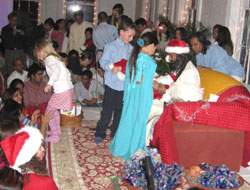 Prior
to the New Jersey event, the Guru had blessed his followers for two days in New
York city through satsang, meditation and celebration to commemorate Christmas,
New Year and Holiday Season.
Prior
to the New Jersey event, the Guru had blessed his followers for two days in New
York city through satsang, meditation and celebration to commemorate Christmas,
New Year and Holiday Season.
For the past 25 years, Sri Sri Ravi Shankar has helped millions of followers lead
a more joyous and peaceful life through meditation. The Art of Living Foundation
is celebrating its silver jubilee in Bangalore from February 17 to 19, 2006. He
is the first Indian spiritual leader to be received in the Oval Office by a US
President, when he met President George W. Bush on May 7, 2004, and has traveled
the globe to meet with world leaders. Last week he was speaking in Germany and
this week he is in Montreal.
In New Jersey, the Guruji handed out gifts to young followers. He also answered
questions on marriage, death and the meaning of life.
 Responding
to a question whether we can be successful materially and spiritually in this
world, the Guruji said "If you have intelligence you can. You can strike the balance
between the body and the mind." The Sunday's event drew families, couples and
friends from different parts of the US, including California, Chicago, Texas,
Pennsylvania, New York and even India.
Responding
to a question whether we can be successful materially and spiritually in this
world, the Guruji said "If you have intelligence you can. You can strike the balance
between the body and the mind." The Sunday's event drew families, couples and
friends from different parts of the US, including California, Chicago, Texas,
Pennsylvania, New York and even India.
"In
India you can't meet him because thousands of people attend his talks," said Kishore
Bandaru of Edison, New Jersey, an Art of Living instructor.
Bandaru, who once worked on Wall Street, said that practicing teachings of the
Guruji have helped him to control anger and stress and he now feels more at ease.
Niyati,
also an Art of Living instructor from Chicago, said the Guruji enthralled a crwod
of 1,500 people with his warm and charming presence, witty humour and inspiring
words of wisdom. After being lead through a powerful meditation by Poojya Sri
Sri Ravi Shankarji, people reported experiencing the most peaceful and joyful
Christmas ever.
The
Art of Living, a volunteer-based organization, teaches yoga, breathing techniques,
meditation and stress elimination at centers, schools, shelters and prisons in
150 countries. Shankar founded the organization in 1982.
Mukesh Panika, an architect and urban planner, who has founded an international
non-profit called ArtsAid in New York City, says that the social and physical
development agenda of the AoLF is what attracted him to the organization. Learning
to breath right, meditation and connecting with people from diverse nationalities
and background is a bonus and a blessing.
Besides
Mukesh and his wife, Garima, there were hundreds of likes of Sonal Shankar from
Cincinnati, Alpa, Sarang and Richa from New Jersey, Niyati Kala Shah, an Art of
Living instructor from Chicago, and Sudhir Kudikala from Connecticut who felt
blessed by meeting the Guru and attending the Satsang and meditation from him.
My
Grandmother
By
Iha Kaul
“Dhaadi,
Dhaadi!” ear chilling screeches bellow my grandmother towards me. The loud
smile on my face is softened when I see my beautiful grandmother amble into the
dark corner of the stairwell. I see her, and remember the times when we would
frolic and prance around. I gaze at her again. This time more intensely, more
deeply. I look into her eyes and visit everything about her. I see all her joy
and all her grief: the happiness and laughter, the anger, and despair. Most of
all, I see her love. Whether there are tears on her cheeks or a smile on her face,
she will never lose the love in her eyes. Everything she has is surrounded by
love. When she is angry, she is angry in a loving way. When she is sad, love always
glimmers off her face. My grandmother’s love is greater than all force alike,
and for this, I admire her more than any words can describe.
I sniff through the darkness. Even the dark pink petals of the roses cannot change
the sweet honey smell of my grandmother. Her steps are graceful and radiant. Her
smile is the epitome of beauty. Her calmness emanates the waves of the bright
blue ocean. I want to go tell her that she is wonderful, that she is the best,
but alas, I cannot, because I can hardly bear to see tears on her delicate face.
I grab hold of her from the depths of my secret hiding place. I squeeze her in
a tight embrace. Her face glows as does mine with delight. In that hug, I feel
her strength, her power, her determination. I feel the burdens that lie in her
heart. Her soft palms tell me more than her intangible words. I feel the iron
fist stuck in her heart. I feel its burning desire to come out. I see the times
when her life was unimaginable, the moments when dreams lifted her high into the
sky, and reality weighed her back down. I realize her obligation to leave school
in the 8th grade, the responsibilities of getting married as a teen. I understand
her frustration of not completing her education. I recognize the pain of leaving
everything she ever knew behind.
“Why
can not I find you?” she asks with a mischievous look on her face. I frown
with disappointment, “Noooo Dhaadi that s’not how you say it,”
already popping out of my hiding place, “you say…” “I found
you!” she shrieks in excitement.
We go to the open room filled with rays from the afternoon sun. I watch her pick
up the tattered old newspaper as the golden light hits her soft face. Her delicate
glasses sit on her nose while she ponders upon the headline in the newspaper.
Her face releases a hidden pride when she figures out what it reads. Her wrinkly
tan skin shows a struggle with every word and phrase that has passed by her life.
I can see in her the power and determination to do anything she wants.
I tightly grip her hand and try to understand. I want to understand everything
about her. Even her small quirks and habits intrigue me. I want to know why she
wakes up so early to pray, why she makes me breakfast, combs my hair and, looks
after me the way she does. At last, I have found the answer. She does it because
she cares.
She cares enough to protect me from the vile and danger of the world. Her gentle
touch comforts me when I feel lost, and protects me when I feel scared and helpless.
It is that care, that helps put my restless mind to sleep, but awakens me fresh
in the morning. Her fragile body with all the strength that it has, inspires me
to do better, to be more. Her care pushes me to limits and boundaries unimaginable.
I wrap my arms around her small waist; both my hands touch each other with out
struggle. She puts her arms on my shoulders and pulls me toward her. In her, I
glimpse qualities like strength, wisdom, power, and gracefulness.
The dark skirt and light cotton shirt are examples of my grandmother’s simplicity.
She will never say anything she does not mean. Everything about her is right on
top of her shoulders. Her words are always sincere and pure.
I think of her hair, brown and white. Each strand is a memento of her experiences.
One look into her light hazel eyes is enough to tell you her entire story. As
I look through those eyes again, I see her unwavering conviction. Through those
small little eyes, I can see galaxies of thought. I can visualize her years passing
like the flash of a camera. I relive the memories. The laughter. The playfulness.
The joy. I notice her thinking about her past, future and present.
In the clutch of my grandmother’s petite but strong arms, I observe all the
beauty that lies within her. I look at my grandmother and believe in the hard
work she has done. She is a woman of character and hardship. She is my support,
my stand, my guardian angel. It is her love that keeps me going farther and farther,
day by day.
The
author Iha Kaul is a Sixth Grade student in Boston, USA.
Qatar
opens doors to first church in 14 centuries
NICOSIA
(CYPRUS), Nov 11: The first Christian church in the conservative Muslim state
of Qatar since the arrival of Islam in the 7th century is to be built on land
donated by the reform-minded Emir of Qatar, Sheikh Hamad bin Khalifa al-Thani.
The
$7 million development of the Church of the Epiphany, which will not have a spire
or freestanding cross, will begin early next year. Clive Handford, the Nicosia-based
Anglican Bishop in Cyprus and the Gulf, says: "We are there as guests in
a Muslim country and we wish to be sensitive to our hosts ... but once you're
inside the gates it will be quite obvious that you are in a Christian center."
The
walkways and grounds of the church, in Qatar's capital, Doha, will have crosses
and flower motifs resembling those used in early Christian churches. "We
hope that the center can be a base for ongoing Muslim-Christian dialogue,"
Bishop Handford told The Monitor.
Qatar's
Anglican community, which has held services in an English-language school in Doha
for decades, is estimated to number between 7,000 and 10,000 people. "Our
church is like a microcosm of the Anglican community," says Ian Young, who
has been the chief Anglican priest in Doha since 1991. "I've got 28 nationalities
from every continent."
Dr.
Young, who is from Perth in Scotland, will run the new church. "It will be
a home for people who are away from home," he says. "As well as a place
of worship, it will be a place where people can meet."
The
complex will include conference facilities, temporary living accommodations, a
library, and a cafe. Also in the works, with land again provided by the Emir,
are church buildings to serve Catholics - who comprise the majority of Qatar's
70,000 Christian expatriates - Egyptian Coptic Christians and Indian Christians.
Missionaries
brought Christianity to the Gulf in the second half of the 5th century but it
disappeared from most Gulf Arab states within a few centuries of the arrival of
Islam. Over the past 100 years, particularly since the discovery of oil, Christian
expatriates have migrated to the region which is currently enjoying an economic
boom that is attracting more foreign workers.
Bishop
Handford accepts that some Qataris might not be happy. "You'd get the same
in the conservative Christian world where mosques are built," Handford says.
"We haven't experienced any problems or difficulties with local people,"
he adds.
In
particular, the emir, who came to power in 1995, has been very supportive. "Were
it not for his agreement, and approval, and generosity, we wouldn't be having
a church," says Bishop Handford.
Gerald
Butt, editor of Middle East Economic Survey, an authoritative Cyprus-based newsletter,
says allowing the church is unlikely to prove controversial there. "Already
Qatar has changed from being a remote, secluded, conservative country to one that's
much more open to the world," he says.
President
inaugurates mega Akshardham temple complex
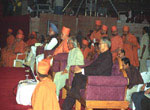 NEW
DELHI, Nov 7: President A.P.J. Abdul Kalam Sunday inaugurated the mega temple
complex of Akshardham in the capital and dedicated it to the nation, saying it
would make every Indian proud.
NEW
DELHI, Nov 7: President A.P.J. Abdul Kalam Sunday inaugurated the mega temple
complex of Akshardham in the capital and dedicated it to the nation, saying it
would make every Indian proud.
'I
congratulate the Bochasanvasi Akshar Purushottam Swaminarayan organisation for
creating such an architectural complex which every Indian would be proud of,'
Kalam told the grand opening ceremony.
Spread
over about 100 acres on the banks of Yamuna river in east Delhi, the complex was
over four years in the making and cost Rs.2 billion ($44 million), funded by donations
from followers of the influential Swaminarayan sect. 'I feel as if I am in some
other world,' Kalam said after a tour of exhibition halls that showcase the best
of Indian culture and heritage through tableaux with animated figures.
As
the sun set, the magnificent complex came alive with hundreds of coloured lights
and lamps and Sanskrit chants filled the air as Pramukhswami Maharaj leader of
the Swaminarayan sect, blessed the gathering. Leader of Opposition L.K. Advani
also attended the inauguration, which was presided over by Pramukhswami Maharaj.
Patterned
on the lines of the Akshardham complex in Gujarat's capital Gandhinagar, the new
complex promises to become a prime tourist destination. It will be opened to public
Tuesday. Apart from the temple, the complex comprises a gigantic monument with
five domes, exhibition halls, an IMAX movie theatre, a musical fountain, a garden
and a pond.
The
141-foot monument, an architectural marvel in pink sandstone and white marble,
has a statue of Lord Swaminarayan - whose followers launched the sect in the 19th
century - in the sanctum sanctorum along with statues of Hindu deities. In the
past two decades, the Swaminarayan sect, which has followers mainly in Gujarat
and among Gujaratis abroad, has built over 600 temples worldwide, including Britain
and the US.
Money
or no money, India fourth in happiness index
LONDON,
Oct 6: India has the fourth happiest population in the world, even ahead of Britain
and Canada, a survey indicated on Wednesday. The survey carried out across 30
nations found that only those living in Australia, the US and Egypt are more upbeat.
Around
30,000 people were questioned in the survey by market research company GfK NOP.
It also found that those in their 50s were the most downbeat, regardless of which
country they were from. The most miserable population were the Hungarians. Australia
was the most cheerful nation, with 46 per cent of the population saying they were
very happy.
This
was followed by the Americans with 40 per cent. Britain shares the fifth happiest
spot with Canada. One in three Britons is "very happy" with the quality
of life in London. Just seven per cent are disappointed with how their lives have
turned out. A separate poll, meanwhile, has named Vancouver in Canada as the world's
best place to live.
The
Economist Intelligence Unit ranked 127 cities by rating them on factors such as
stability, personal risk, healthcare, culture and environment, education, infrastructure
and the availability of goods and services. All the cities that fell into the
top "liveability" bracket were in Canada, Australia and Western Europe.
Melbourne, Vienna, Geneva and Perth made up the rest of the top five.
But
London failed to make a big impression, coming in a lowly joint 47th. It was ranked
on par with Dublin and Los Angeles, but way behind Paris (16th). Manchester was
the highest-ranked British city at joint 41st. "In the current global political
climate, it's no surprise the most desirable destinations are those with the lower
perceived threat of terrorism," said Jon Copestake, editor of the EIU report.
The worst places to live were Algiers in Algeria and Port Moresby in Papua New
Guinea because "many aspects of daily life present challenges."
More
than 1 million greet Pope in Germany
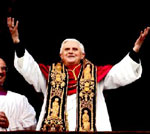 COLOGNE,
Aug 21: More than 1 million Roman Catholic young people who had camped out overnight
in an enormous field welcomed Benedict XVI on Sunday for the concluding Mass of
his four-day trip to Germany, his first foreign travel as pope.
COLOGNE,
Aug 21: More than 1 million Roman Catholic young people who had camped out overnight
in an enormous field welcomed Benedict XVI on Sunday for the concluding Mass of
his four-day trip to Germany, his first foreign travel as pope.
As
he began his homily, calling on the pilgrims and visitors on World Youth Day to
make wise use of the freedom God had given them, the sun broke through the thick,
gray clouds. "Freedom is not simply about enjoying life in total autonomy,
but rather about living by the measure of truth and goodness so that we ourselves
can become true and good," he said.
He
said there is a "strange forgetfulness of God," while at same time the
sense of frustration and dissatisfaction has led to a "new explosion of religion."
"I
have no wish to discredit all the manifestations of this phenomenon. There may
be sincere joy in the discovery," he said. "Yet, if it is pushed too
far, religion becomes almost a consumer product. People choose what they like,
and some are even able to make a profit from it."
"But
religion constructed on a 'do-it-youself' basis cannot ultimately help us. Help
people to discover the true star which points out the way to us: Jesus Christ."
He urged the youth to take the time to regularly attend Sunday Mass. "If
you make the effort, you will realize that this is what gives a proper focus to
your free time," he said.
The
crowds listened intently as he spoke in German, English, Italian and French. As
Benedict was driven to the altar overlooking the Marienfeld, or Mary's Field,
in his tall, glassed-in popemobile, the sound of hymns played as thousands of
priests lined up to assist in the service. Pilgrims cheered the 78-year-old German
pope as he walked to the main altar, wearing a gold miter and waving to the crowd.
He smiled as he ascended the raised altar platform and began the service.
Cardinal
Joachim Meisner, the archbishop of Cologne, welcomed Benedict, who was making
his first trip back to his homeland since becoming pope in April. He paid tribute
to the young people in attendance, who he said numbers more than 1 million. "Here
in the midst of the youth of the world, and countless priests, bishops and cardinals,
we would like to welcome you to Marienfeld," Meisner said. "You belong
to the youth, and the youth belongs to you."
Learning
Yoga in Germany
Suresh
Rateria, an Indian businessman, who was initiated into Yoga 10 years ago, attends
a four-week intensive Yoga teachers training programme in Bad meinberg, Germany.
Yoga Vidya Centre, which has 30 branches in Germany, is run by Bretz Brothers.
Since its inception, the Centre has produced hundreds of Yoga teachers. Here are
his impressions:
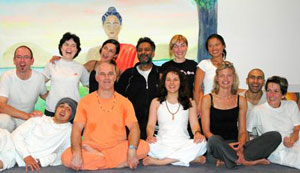 BAD
MEINBERG (GERMANY), Aug 17: I have been a student of Yoga for the past 10
years. My business contacts with Bretz brothers exposed me to the Yoga Vidya Centre
in Germany. Both the Bretz brothers run the Haus (House) Yoga Vidya, with more
than 30 centres in Germany itself. Though the institute has been conducting the
teachers training programme for over a decade, it was for the first time that
it conducted the course in English.
BAD
MEINBERG (GERMANY), Aug 17: I have been a student of Yoga for the past 10
years. My business contacts with Bretz brothers exposed me to the Yoga Vidya Centre
in Germany. Both the Bretz brothers run the Haus (House) Yoga Vidya, with more
than 30 centres in Germany itself. Though the institute has been conducting the
teachers training programme for over a decade, it was for the first time that
it conducted the course in English.
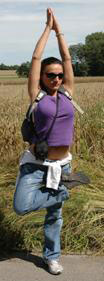 The
popularity of the Yoga Vidya Centre is such that as many as 20 international students
from as many countries attended the English batch. There were nearly 400 other
students who were there for the classes in German. Needless to say that I was
the only Indian amongst such a large group. Everybody looked up to me with respect.
It made me feel proud to be an Indian. However, most people could not figure out
why I was learning yoga here and not in India.
The
popularity of the Yoga Vidya Centre is such that as many as 20 international students
from as many countries attended the English batch. There were nearly 400 other
students who were there for the classes in German. Needless to say that I was
the only Indian amongst such a large group. Everybody looked up to me with respect.
It made me feel proud to be an Indian. However, most people could not figure out
why I was learning yoga here and not in India.
I
must say that there is no formal Yoga institute in India. And I was always keen
to do a formal course which would allow me to impart and spread this great knowledge
to others. What better place than Germany. The four-week intensive Yoga teachers
training course was compact and was a guide through a practical system for developing
the entire personality. Yoga Vidya Centre teaches the holistic approach to classic
yoga, as developed by Swami Sivananda of Rishikesh.
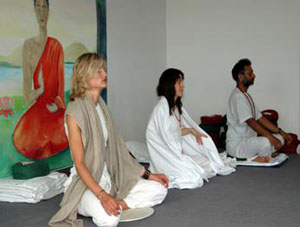 One
of the grand Masters of Yoga of the 20th century, Swami Shivananda is the inspiration
behind all Yoga Vidya centers. Over 20 years ago, one his disciples, Sukhadev
Bretz, took it upon him to spread the message of Yoga in Germany and today he
can boast of having trained thousands of teachers who are now all across the globe
teaching this ancient Indian art of Yoga.
One
of the grand Masters of Yoga of the 20th century, Swami Shivananda is the inspiration
behind all Yoga Vidya centers. Over 20 years ago, one his disciples, Sukhadev
Bretz, took it upon him to spread the message of Yoga in Germany and today he
can boast of having trained thousands of teachers who are now all across the globe
teaching this ancient Indian art of Yoga.
Swami Atma Swaruparamananda presided over our course. French by birth but now
living in Texas, Swami Atma renounced the world decades ago after having been
a disciple of Swami Vishnu Devananda and dedicated his life enlightening the world
about Yoga, Vedanta and the Bhagwat Geeta.
The international students
had varied reasons for attending the course. Mathilda from France (now ordained
Radha) was the best student of the lot with years of yoga practice behind her
and wishes to be reborn again to continue learning about the wonders of Vedanta
and Yoga.
"Yoga and Ayurveda never ceases to amaze me," says
Emma, a bio-molecular scientist by profession, from Iceland. She is planning to
be in India to learn more about Indian mysticism, ayurveda and other fields of
alternate medicine. She had recently launched a fitness centre and named it
'ima-nu-now', all words meaning the present.
Polie and Sofia, the Greek
sisters, were here to learn to teach Yoga in their country and ran a fitness centre
in Athens.This course being the only institution certifying one as a teacher,
they did not want to miss the opportunity.
Markus was simply drawn by
the 'energy' encompassing these premises, took a job at the centre and decided
to stay back. Soraya Faris from Saudi Arabia had been into yoga for countless
years and was there to get her certificate to be able to formally teach yoga.
Micki Rodgers, mother of four grown ups, from the UK , an expert in yoga,
admitted that chanting of bhajans and practicing yoga soothed her mind and body.
The challenge of participating in the intense teachers training program was too
much to resist. Fascinated by Goddess Sarawasti, she was later bestowed with a
spiritual name, Jnaneswari.
Jade Theresa, her spiritual name Parvati,
a dancer by profession, was hired by a luxury cruise liner to do this course.
She would be spending the next eight months on the high seas teaching yoga to
on board guests.
I personally was there to strengthen my back through
the practice of yoga. I have been suffering from two prolapsed disks that were
to be operated upon after my return. The 14 hours per day of intense meditation,
mantra chanting and yoga practice for 21 days had me thinking otherwise. I plan
to go back again rather than throwing myself at the mercy of the doctors.
Atmaram Bretz, who runs a similar centre at Mainz, felt that good many of
the people who visited the centre were not able to explain why they were here,
except for the fact they were strongly drawn towards it as if they have had a
connection with it in their previous lives. Once into yoga, they tended to forget
all their troubles of the yester years and looked forward to a new beginning.
The teachers' training program provides one with a thorough educational
base for one's personal practice as a teacher. It aims at developing the personality
or to experience yoga at a deeper level.
The course content was in a
way, the essence of the India ancient philosophy bundled into a four week package.
Starting from the preparatory exercises the course moves on to imparting different
techniques in relaxation, asana, postures combined with charka concentration,
special breathing techniques, mantras and mudras.
A practical approach
is made to impart knowledge about Pranayama (breathing exercises), Kriyas (yoga
cleansing exercises), Physiology and health, Ayurveda and nutrition -- all aimed
at a healthy, holistic living.
The course is an absolute must for anyone
who seeks the truth about one self.
Amarnath
yatra resumes
JAMMU,
July 23: After remaining suspended for a day, the Amarnath Yatra was resumed today
with a fresh batch of 3,465 pilgrims leaving here for the cave shrine in South
Kashmir Himalayas.
The
yatra was suspended yesterday as landslips between Ramban and Ramsoo blocked the
Jammu Srinagar National Highway, official sources said here. The landslips were
cleared by the Border Roads Organisation last evening enabling the onward movement
of pilgrims from Jammu, they said.
Reports from Srinagar said pilgrims also
left from base camps of Pahalgam and Baltal towards the cave shrine as the weather
was clear. About 2.44-lakh pilgrims have paid their obeisance at the cave shrine
since the pilgrimage began on June 21.
AUM
By
Suresh Rateria
 God’s
symbol, according to Patanjali, is the syllable AUM. This sound is divine: it
stands in praise of divine fulfillment. AUM is the universal sound (sabda brahman).
Philosophically, it is regarded as the seed of all words. No word can be uttered
without the symbolic sound of these three letters, a, u, and m. AUM represents
communion with God, the Soul and with the Universe.
God’s
symbol, according to Patanjali, is the syllable AUM. This sound is divine: it
stands in praise of divine fulfillment. AUM is the universal sound (sabda brahman).
Philosophically, it is regarded as the seed of all words. No word can be uttered
without the symbolic sound of these three letters, a, u, and m. AUM represents
communion with God, the Soul and with the Universe.
AUM
is known as pranava, or exalted praise of God. God is worshipped by repeating
or chanting AUM, because sound vibration is the subtlest and highest expression
of nature. AUM repeated with the feeling and awareness of its meaning, overcomes
obstacles of Self – Realisation.
The
Sanskrit word Aum, according to Sri Vinoba Bhave, conveys the concept of omnipresence,
omniscience and omnipotent. The
symbol AUM is composed of three syllables, namely the letter A, U, M and when
written has a crescent and a dot on its top. A few of the various interpretations
given to it are mentioned here to convey its meaning.
The
letter A symbolizes the conscious or waking state (jagrata avastha), the letter
U the dream state (svapana avastha) and the letter M the dreamless sleep state
(susupta avastha) of the mind and spirit. The entire symbol, together with the
crescent and the dot, stands for the fourth state (turiya avastha), which combines
all these states and transcends them. This is the state of Samadhi.
The
three letters also represent the dimensions of length, breadth and depth, while
the entire symbol represents Divinity, which is beyond the limitation of shape
and form.
The
three letters A,U and M symbolizes the absence of desire, fear and anger, while
the whole symbol stands for the perfect man (asthita prajna), one whose wisdom
is firmly established in the divine.
They
also depict the three stages yogic discipline, namely, asana, pranayama and pratyahara.
The entire symbol represents Samadhi, the goal for which the three stages are
the steps.
They
also represent the triad of Divinity, namely, Brahma - the Creator, Vishnu - the
Maintainer, and Shiva – the Destroyer of the universe. The whole symbol is
said to represent Brahman from which the universe emanates.
AUM
SHANTI
John
Paul II will be made a saint next month: Aide
 ROME,
July 10: Pope John Paul II's closest aide said in an interview on Saturday that
he hoped the late pontiff would be made a saint during World Youth Day in Cologne,
Germany next month.
ROME,
July 10: Pope John Paul II's closest aide said in an interview on Saturday that
he hoped the late pontiff would be made a saint during World Youth Day in Cologne,
Germany next month.
"Everything
is possible, but I don't know if it would be opportune," Archbishop Stanislaw
Dziwisz said. But he said the Cologne setting would be perfect because "no
one loved young people like the pope and they loved him." He said "it
would be wonderful for a German pope to canonize a Polish pope in Cologne."
Dziwisz
also said Pope Benedict XVI will visit Poland next spring. "He has promised
it," he said. So far, Benedict has only one confirmed foreign trip on his
calendar, the August 18-21 visit to Cologne.
Speculation has been swirling
about whether he might beatify John Paul during the World Youth Day celebrations
-- placing the late pope on an even faster track to possible sainthood.
Already,
Benedict waived the traditional five-year waiting period and allowed the beatification
process to officially begin just three months after John Paul died April 2. Dziwisz,
John Paul's trusted private secretary, specified that he wanted John Paul canonized
-- not just beatified -- during the Cologne visit.
Asked
if Benedict might declare John Paul a martyr -- which would spare the Vatican
from having to find and confirm a miracle attributed to John Paul -- Dziwisz responded:
"In any case, people want him to be a saint.
Light
on Yoga
By
Suresh Rateria
 NEW
DELHI: The word Yoga is derived from the Sanskrit root yuj meaning to bind, join,
attach and yoke, to direct and concentrate one's attention on, to use and apply.
It also means union or communion. It is the true union of our will with the will
of God.
NEW
DELHI: The word Yoga is derived from the Sanskrit root yuj meaning to bind, join,
attach and yoke, to direct and concentrate one's attention on, to use and apply.
It also means union or communion. It is the true union of our will with the will
of God.
Yoga
is an art, a science and a philosophy. It touches the life of man at every level,
physical, mental and spiritual. It is a practical method for making one's life
purposeful, useful and noble.
 The
practice of yoga helps the lazy body to become active and vibrant. It transforms
the mind, making it harmonious. Yoga helps to keep one's body and mind in tune
with the essence, the soul, so that all three are blended into one.
The
practice of yoga helps the lazy body to become active and vibrant. It transforms
the mind, making it harmonious. Yoga helps to keep one's body and mind in tune
with the essence, the soul, so that all three are blended into one.
Yoga
calls for a very simple and disciplined life giving importance to every aspect
- food, lifestyle, habits and thus follows certain basic laws that can bring about
clarity and freedom. Patanjali enumerates these means as the eight folds or limbs
of Ashtanga Yoga for the quest of the soul. These are:
1. Yama (self restraint)
2. Niyama (self purification by discipline)
3. Asana (yogic postures)
4. Pranayama (rhythmic control of the breath)
5. Pratyahara (withdrawal of
the mind from the domination of the senses and external objects)
6. Dharana
(concentration)
7. Dhayana (meditation)
8. Samadhi (oneness with universal
spirit or Paramatma)
 Yama
and Niyama are the basic codes of yogic life and control the yogi's passions and
emotions and keep him in harmony with his fellow men.
Yama
and Niyama are the basic codes of yogic life and control the yogi's passions and
emotions and keep him in harmony with his fellow men.
Asanas
keep the body healthy and strong and in harmony with nature. Finally, the yogi
becomes free of the body consciousness. He conquers the body and renders it a
fit vehicle for the soul. The first three stages are the outward quests (bahiranga
sadhana).
 The
next two stages, Pranayama and Pratyahara, teach the aspirant to regulate the
breathing, and thereby control the mind. This helps to free the senses from the
thresh hold of the objects of desire. These two stages of Yoga are known as the
inner quest (antaranga sadhana).
The
next two stages, Pranayama and Pratyahara, teach the aspirant to regulate the
breathing, and thereby control the mind. This helps to free the senses from the
thresh hold of the objects of desire. These two stages of Yoga are known as the
inner quest (antaranga sadhana).
Dharana,
Dhyana and Samadhi take the yogi into the innermost recess of his soul. The yogi
does not look heavenward to find God. He knows that HE is within, being known
as the Antaratma (the Inner self). The last three stages keep him in harmony with
himself and his Maker. These stages are called antaratma sadhana, the quest of
the soul.
Yama
comprises the basic laws that one needs to follow to lead a happy life. These
are:
1. Satya ( truth)
2. Ahimsa (non - violence in mind, word and action)
3. Asteya (non - stealing)
4. Aparigraha ( Non - hoarding)
5. Brahmacharya
(continence)
These
commandments are the rules of morality for the society and the individual, which
if not obeyed bring chaos, violence, untruth, stealing, dissipation and covetousness.
The roots of these evils are the emotions of greed, desire and attachment. This
only brings pain and ignorance. One can strike at the root of these evils by changing
the direction of one's thinking along the five principles of yama.
Niyama or self-restraint is the rule of conduct that apply to individual discipline,
while yama are universal in their application. The five niyama listed are:
1. Saucha - This means cleanliness of the body both internal and external
2. Santosha - This means contentment
3. Tapa - This means conditioning of
the body with adverse situations
4. Swadhayaya - This means reading of spiritual
textbooks combined with self-analysis
5. Ishvara Parnidhana - This means surrender
to the Lord of one's action and will
Asana
Asana means posture, the positioning of the body as a whole with the involvement
of the mind and soul. Patanjali's Yoga Sutras define asana as the feeling of well-being
and a posture. There are 84 lakhs postures in Yoga and all of them basically target
to prepare a person for just four postures - siddhasana, padmasana, vajrasana
and sukhsasana. All these are meditative postures.
Asanas
act as bridges to unite the body with the mind, and the mind with the soul. Practice
of asana has both a strengthening and a cleansing effect: physically in the rejection
of disease, mentally by ridding our mind of stagnated thoughts or prejudices.
One should aim at performing these postures for a long duration effortlessly.
Pranayama
Prarna means breath or life force and ayam means control or expansion. Pranayama
means the expansion of the life force through the control of the breath. Irregular
flow of breath can be controlled by a deliberate process. This control creates
ease in the inflow and outflow of breath. When this ease is attained, the breath
must be regulated with attention. This is Pranayama. There are three parts of
pranayama: purak (controlled inhalation), rechak (controlled exhalation) and kumbak
(retention).
Pranayama
strengthens the respiratory system, soothes the nervous system and reduce craving.
As desires and cravings diminish, the mind is set free enhancing the power of
concentration.
Pratyahara
As per the yoga sutras of Patanjali, through the practice of yama, niyama, asana
and pranayama, the body and its energy are mastered. The next stage, pratyahara,
achieves the conquest of the senses and the mind.
This forms the foundation
for dharna, dhyana and Samadhi.
India
to take up Kailash route issue with China: Manmohan
LEH,
June 12: Observing that there was improvement in Sino-Indian ties, Prime Minister
Manmohan Singh today said India will take up with China the issue of opening up
of the route to Kailash Mansarovar through Ladakh in Jammu and Kashmir.
"We
will make an effort," he told reporters at Leh airport when asked whether
there was any hope of the Ladakh route opening up to Kailash Mansarovar yatra.
"Our relations with China are improving. We will raise this issue (opening
of the route) with them in talks," he said before winding up his three-day
tour of Ladakh region during which he visited Siachen Glacier and addressed troops
there.
Singh
had said yesterday that India would favour opening up of the Ladakh route for
pilgrims as it would reduce the duration of the pilgrimage drastically. Thousands
of Hindu devotees undertake the yatra annually to the religious place in Tibet
through a more difficult and long route via Uttaranchal.
To
a question, the Prime Minister said the Central Government would do everything
possible to ensure peace and prosperity of the backward Ladakh region. During
the visit to Ladakh, Singh laid foundation stone for two power projects.
Solemn
mass for new Pope
 VATICAN
CITY, April 25: Pope Benedict XVI was installed as the Roman Catholic Church's
265th pope on Sunday, in a solemn mass in front of world leaders and pilgrims
alike that will make him spiritual leader of more than a billion followers. Up
to half a million people thronged Saint Peter's Square and surrounding streets
for the mass, the first of its kind since the inauguration of his predecessor
John Paul II in October 1978.
VATICAN
CITY, April 25: Pope Benedict XVI was installed as the Roman Catholic Church's
265th pope on Sunday, in a solemn mass in front of world leaders and pilgrims
alike that will make him spiritual leader of more than a billion followers. Up
to half a million people thronged Saint Peter's Square and surrounding streets
for the mass, the first of its kind since the inauguration of his predecessor
John Paul II in October 1978.
Pilgrims
from around the world, including tens of thousands of Germans, flooded into the
vast square from the early hours, long before the mass began. Delegations from
140 countries attended the mass, including 36 heads of state and government. Pride
of place went to the delegation from the pope's own Germany led by President Horst
Koehler and Chancellor Gerhard Schroeder.
The
new pope's brother, Georg Ratzinger, who at 81 is three years older and himself
a retired priest, was among the special guests. Before
his brother's election on Tuesday, Georg Ratzinger said he believed he was "too
old" to become pope and that being German was a liability.
US
President George W Bush was represented by his brother, Jeb Bush. A convert to
Catholicism, Jeb Bush said his brother's several meetings with John Paul II underscored
the White House's recognition of "the importance of a moral voice in world
affairs."
The
mass combined ancient and modern elements linking the new pontiff to the founders
of the Roman Catholic Church, Saints Peter and Paul. In a first for an inauguration,
the proceedings began with a visit by Benedict to the tomb of John Paul II, who
was laid to rest in the crypt of St Peter's Basilica on April 8.
Later
Benedict received the insignia of office: a pallium - a circular band of fabric
with a pendant and decorated with square crosses - and the Fisherman's Ring with
the image of St Peter. The
ceremony reflected the worldwide reach of the Church. The scripture readings were
in English and Spanish and prayers will be recited in French, German, Chinese,
Portuguese, Arabic, Greek and Latin.
Surveys:
Young adults search spirituality
WASHINGTON,
April 14: For some young adults, spirituality goes hand in hand with religious
practice. For others, it is a substitute. Regardless, young Americans are actively
engaged in spiritual questions, two new surveys indicate, even if they may not
be exploring them in traditional ways.
One
of the surveys, of more than 100,000 freshmen who started college last fall, found
four in five reporting an interest in spirituality, with three in four searching
for meaning or purpose in life, and the same proportion discussing the meaning
of life with friends.
The
students starting college expected their institutions to help them explore such
questions. And while an even higher proportion, more than 90 percent, said they
expect their college to prepare them for employment, the authors noted that the
results challenge the view of young Americans as crassly materialistic.
"They
are looking inwardly and they are searching for ways to cultivate their inner
selves," said Helen Astin, professor emeritus of higher education and a senior
scholar UCLA's Higher Education Research Institute, which produced the survey
of college freshman released Wednesday in Washington.
A separate survey of
1,325 18-25 year-olds released earlier this week by Reboot, a Jewish networking
group, and several collaborating organizations, emphasizes the degree to which
young people are confronting religious issues informally, through conversations
and even Christian rock music rather than formal religious practice.
While
44 percent of respondents called themselves "religious," 35 percent
said they are "spiritual but not religious" and 18 percent said neither.
At Roanoke College, in Salem, Va., where he has been chaplain for more than
20 years, Paul Henrickson said he is quite familiar with the "spiritual but
not religious" phenomenon.
"You
have a lot of kids that understand in their hearts that there is a mystery about
life that is larger than they are and larger than they understand, and they would
call that 'spiritual.' And they are very interested in that," Henrickson
said.
But,
he added, "they pursue that in private ways" and "in kind of a
shotgun approach. They'll look at all kinds of things from Eastern religions to
yoga to New Age stuff to the standard Christianity. But they are unlikely to have
that solid commitment to a religious institution (like) church membership."
Still, many students view spirituality as a complement to their religious
beliefs. In the UCLA survey, for instance, Mormons, Baptists and nontraditional
Christians all exhibited high degrees of both spirituality and religious engagement
as measured by such things as praying, attending services and reading sacred texts.
Students
exhibiting high religious engagement were more likely to have conservative social
views, though some issues like the death penalty and affirmative action do not
conform to the pattern. "It's very difficult to put people in boxes,"
Astin said in a telephone interview.
The
survey's authors challenged American colleges and universities to be more responsive
to the spiritual hunger of their students. They said previous studies have indicated
older college students are disappointed with how infrequently they have been challenged
to think about "meaning of life" issues in class.
UCLA
plans to check back with the students when they are juniors; for now, the survey
says nothing about the effects of college because it captures students at the
very beginning of their college careers. HERI's previous studies have found students'
participation in organized religion fell during their college years, though interest
in spiritual questions persists. But the studies and other data suggest the late
teens are a time when serious contemplation of spiritual issues begins.
Previous
research by Chris Smith, a University of North Carolina sociologist and adviser
to the UCLA study, found 13-17 year-olds are highly conventional in their religious
practices, following how they were raised. But just 9 percent of the UCLA respondents
said they felt compelled to follow their parents' religious practice. While 42
percent described themselves as "secure" in their spiritual and religious
views, 10 percent said they were "doubting," 23 percent "seeking"
and 15 percent "conflicted" (respondents could choose more than one
response).
College students, Smith said, "are starting to branch
out somewhat in their thinking and their exploring."
Pope's
funeral to be held on Friday
VATICAN
CITY, April 4: The funeral of Pope John Paul II will be held at 10 am on Friday.
The Pope will be buried in the crypt below St. Peter's Basilica, the Vatican has
announced. Monday's announcement ends speculation that the Polish-born Pope might
have wanted to be laid to rest in his homeland.
Meanwhile,
about a lakh people packed St Peters square to attend a requiem mass in memory
of Pope John Paul II. The Pope's body, wrapped in crimson and papal finery, rests
at the Apostolic Palace at the Vatican, where people are lining up to get a glimpse
of one of the most popular of Popes.
His
body will now be moved to St. Peter's Basilica for public viewing till his burial
in the crypt on Friday. For now the focus remains the 117 cardinals as they arrive
in Rome to elect the new Pope. Three Indian cardinals will be taking part in this
conclave. Cardinal
Telesphore Toppo, said to be in the running for the Pope's job, was handpicked
by Pope John Paul II for the prestigious congregation of Bishops in October this
year.
"We
are not selecting anyone as Pope. Whoever he wants will be selected. He will give
him the strength to do the job," said Cardinal Telesphore Toppo, Catholics
Bishops Conference of India. The
cardinal's conclave will elect a new Pope in a highly secretive ceremony at the
Sistine Chapel and few are giving anything away.
The
Vatican is expected to host 200 foreign delegates, including India's Vice President
Bhairon Singh Shekawat for the funeral.
Pope
John Paul II dies at 84
 VATICAN
CITY, April 3: Pope John Paul II, the Polish pontiff who led the Roman Catholic
Church for more than a quarter century and became history's most-traveled pope,
died Saturday night in his Vatican apartment. He was 84. "The angels welcome
you," Vatican TV said after the announcement came from papal spokesman Joaquin
Navarro-Valls.
VATICAN
CITY, April 3: Pope John Paul II, the Polish pontiff who led the Roman Catholic
Church for more than a quarter century and became history's most-traveled pope,
died Saturday night in his Vatican apartment. He was 84. "The angels welcome
you," Vatican TV said after the announcement came from papal spokesman Joaquin
Navarro-Valls.
"The
Holy Father died this evening at 9:37 p.m. (2:37 p.m. EST) in his private apartment.
All the procedures outlined in the apostolic Constitution `Universi Dominici Gregis'
that was written by John Paul II on Feb. 22, 1996, have been put in motion,"
Navarro-Valls said. Cardinal Angelo Sodano, the Vatican No. 2 official, led a
tearful crowd of 70,000 people in St. Peter's Square in prayers for the pope.
Some
people held their hands to their heads in disbelief. Others cried uncontrollably
as they stood in the massive plaza beneath the pope's still-lighted apartment
windows. A Mass was scheduled for St. Peter's Square for 10:30 a.m. (4:30 a.m.
EDT) Sunday.
John
Paul declined rapidly after suffering heart and kidney failure following two hospitalizations
in as many months. Just two hours before announcing his death, the Vatican had
said he was in "very serious" condition, although he was responding
to aides.
Since
his surprise election in 1978, John Paul traveled the world, inspiring a revolt
against communism in his native Poland and across the Soviet bloc, but also preaching
against consumerism, contraception and abortion.
John
Paul was a robust 58 when the cardinals stunned the world and elected the cardinal
from Krakow, the first non-Italian pope in 455 years.
In his later years,
however, John Paul was the picture of frailty, weighed down by ailments that included
Parkinson's disease. Although he kept up his travels, he was no longer able to
kiss the ground.
The
Day of Women at Gobind Sadan
By
Deepak Arora
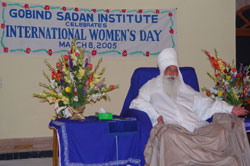 NEW
DELHI: It was a 'Day of Women' at Gobind Sadan, a unique religious place where
people of all casts and creed work, worship and live together as one family. The
women from India, the US, Russia, Kazakhstan and Bashkirir celebrated the unique
strengths bestowed on the better half to mark the International Women's Day on
March 8.
NEW
DELHI: It was a 'Day of Women' at Gobind Sadan, a unique religious place where
people of all casts and creed work, worship and live together as one family. The
women from India, the US, Russia, Kazakhstan and Bashkirir celebrated the unique
strengths bestowed on the better half to mark the International Women's Day on
March 8.
A
culture programme marked the day that included celebrations through songs, dances
and kirtan, poetry reading and lectures. Gobind Sadan's founder and preceptor,
the great visionary and healer, Baba Virsa Singh, spoke on the spiritual role
and responsibilities of women.
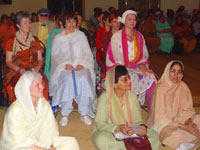 Baba
Virsa Singh reminded that women were given great respects in all traditions be
it Hinduism, Islam or Sikh. "In India we always take the name of woman first
be it Sita-Ram or Radha-Shyam. Even before offering 'Ahuti' of incense or ghee
in the 'Havan' to Agni Devta (the God of Fire) we take the name of his wife, Sawaha.
In Islam, Fatima is known as the 'Woman of Heaven' and Arabia is considered a
great saint. In Sikhism, Guru Nanak praised women and told men of the time 'How
can you denigrate those who give birth to our kings?'
Baba
Virsa Singh reminded that women were given great respects in all traditions be
it Hinduism, Islam or Sikh. "In India we always take the name of woman first
be it Sita-Ram or Radha-Shyam. Even before offering 'Ahuti' of incense or ghee
in the 'Havan' to Agni Devta (the God of Fire) we take the name of his wife, Sawaha.
In Islam, Fatima is known as the 'Woman of Heaven' and Arabia is considered a
great saint. In Sikhism, Guru Nanak praised women and told men of the time 'How
can you denigrate those who give birth to our kings?'
What
is great about Babaji is that he practices in real life what he teaches. At Gobind
Sadan the women have been given key management positions and responsibilities.
Mary
Pat Fisher, whose Prentice Hall textbook "Living Religions" is used
by colleges worldwide, says "in most traditions the clergy are mainly men
and women are not seen as capable of achieving enlightenment. Gobind Sadan is
unique. Here Baba Virsa Singh makes not distinction between men and women in assigning
spiritual duties."
Netasha
Schenyeva, a member of the Executive of the International Association of Peace
through Culture, from Ekaterinasburg, said "while in some parts of the world
women are often held in low esteem, here in Gobind Sadan Maharaj ji strengthens
us morally and spiritually so that we can put the highest principles into practice
in our daily lives and thus realize the destiny of women.
Others
who spoke included Galina Ermolina, Educator from Novozibirsk, Sinberia; Prof
Kim Shilin Ivanovich of Moscow State University; and Dr Khalila Saburova of Urals
region.
2.50
lakh Vaishnodevi pilgrims pay obeisance during Jan
 KATRA,
Feb 3: About 2.50 lakh pilgrims from within and outside the state have visited
the holy cave Shrine of Mata Vaishno Devi Ji during the month of January this
year. During the corresponding period of last year 2.24 lakh pilgrims had darshan
at the holy cave shrine. In the second fortnight of January 2005 over 1.08 lakh
devotees paid their obeisance at the holy cave shrine of Mata Vaishno Devi Ji.
KATRA,
Feb 3: About 2.50 lakh pilgrims from within and outside the state have visited
the holy cave Shrine of Mata Vaishno Devi Ji during the month of January this
year. During the corresponding period of last year 2.24 lakh pilgrims had darshan
at the holy cave shrine. In the second fortnight of January 2005 over 1.08 lakh
devotees paid their obeisance at the holy cave shrine of Mata Vaishno Devi Ji.
Presently
4,000 to 5,000 pilgrims are daily reaching at Katra town, which is the base camp
for the pilgrimage of Mata Vaishno Devi Ji. Besides rented, free accommodation
to the yatris is available in the Shrine Board seria at Adhkuwari, Sanjichatt
and Darbar. Blankets are also provided to the devotees free of charges on depositing
prescribed security.
Meditation
leads to peace of mind
By
Prem Sehgal
 In
this present environment of the world, greed and selfishness have overpowered
the body, mind and intellect of man. As a result of this, he has lost the peace
of mind resulting in various physical and mental problems. The solution of this
problem lies only in religion and spiritualism. To achieve success in this field,
control of mind, concentration and meditation are the best means. Mind torments
man in the field of his day-to-day life and the worldly problems. What is mind
after all? It is only a bundle of thoughts. According to the saints, the mind
is like water, basically pure and divine but is made impure or coloured by our
good or bad actions.
In
this present environment of the world, greed and selfishness have overpowered
the body, mind and intellect of man. As a result of this, he has lost the peace
of mind resulting in various physical and mental problems. The solution of this
problem lies only in religion and spiritualism. To achieve success in this field,
control of mind, concentration and meditation are the best means. Mind torments
man in the field of his day-to-day life and the worldly problems. What is mind
after all? It is only a bundle of thoughts. According to the saints, the mind
is like water, basically pure and divine but is made impure or coloured by our
good or bad actions.
For concentration and meditation, control of mind is the first requisite. Logic
and studies alone will not suffice. It requires continuous practice to bring the
mind under discipline. As we are deeply engrossed in our busy living and are torn
asunder by various desires and attachments, it is but natural that our mind remains
restless and wanders away from one object to another. But it is possible to bring
it under control during meditation by utilizing the major part of the mind for
concentration and some of it as a watchful eye. It is natural with the mind to
run wild with other thoughts, but watchful eye would be able to bring it back
again and again and keep it disciplined.
If
we are travelling in a train with a robber, knowing fully well his evil designs,
it would be imperative for us to remain very careful and vigilant from this companion,
apart from the act of travelling with him. There is a beautiful simile of the
man walking with a cup full of milk in his hand. As the milk from the overfilled
cup is bound to fall down, if the person is not careful and cautious, he has got
to keep a watchful eye on the cup of milk over and above the act of walking. This
constant watchful eye can play an important part in stopping the mind from fruitless
wandering during the period of meditation. It is not an easy task but at the same
time not impossible. With practice and effort, it can work wonder.
In the Bhagwat Geeta, the importance and practice of Meditation or the Yoga of
Meditation have been very well explained by Lord Krishna during his discourses
to Arjuna. In Chapter VI of the Bhagwat Geeta, the importance and practice of
Meditation have been exhaustively explained by the Lord for the benefit of the
humanity irrespective of caste, creed and religion. Now, the important question
of the seeker would be to know what is the technique of meditation and how to
practise it.
As
explained in the Bhagwat Geeta, it is important that the place of meditation should
be neat and clean since extrernal conditions have a direct bearing on the mind.
In a clean place, there is more chance for the seeker to maintain a cleaner mental
condition. The meditator is asked to sit steady in his seat of meditation. The
body should not move at short intervals nor swing either forward or backward and
the seeker should sit steady.
In
order to get established in a firm posture it would be advisable to sit in any
comfortable seat with the vertebral column erect, fingers interlocked and hands
kept in front. The next step would be to choose a holy Mantra (or name of one's
chosen Diety) or the Mantra given by your Satguru. It could be even OM or Ram
suiting the individual. One has to chant and concentrate on this holy mantra or
syllable with all sincerity and faith fixing your attention on the tip of your
nose or between the eye-brows.
During
this period of practice, the mind as per its habit, would start wandering away
from its point of concentration because the mind is by nature restless and unsteady.
During this practice, even though the seeker has brought his sense organs to a
large extent under his control, still the mind disturbed by the memories of the
past experiences would shoot out in search of its sense objects. These wanderings
of the mind may be due to the memories of the past. But Lord Krishna categorically
says that whatever be the reasons because of which the restless and the unsteady
mind wanders away, the seeker is not to despair but should understand that it
is the very nature of the mind to wander and that the process of meditation is
only to stop this wandering.
The
seeker is advised to bring back the mind that has rushed out into its self-appointed
dissimilar channels of thinking. This withdrawal of the mind may be successful
to some extent by sheer will power but ere long the seeker will find that the
mind has rushed out again to another fancied line of thinking. Very rarely does
the seeker realizes that the mind means "the flow of thought". Therefore,
in the technique of meditation when the mind is withdrawn from the sense objects,
this process of withdrawal is to be complemented by a conscious effort by the
meditator in applying the same mind at once in the contemplation of the Self or
God.
Krishna here wants to remove all misunderstandings from the heart of the meditators
and explains to them the effects and benefits of such meditation. Through the
steady and regular meditation, the scriptures promise only inner purification.
Agitations in the mind are its impurities. A purified mind is that which has no
agitations and when the mind has thus become pure and steady, the consciousness
looking at the steady reflection of itself comes to rediscover its own real nature.
It is this stage which is our true goal of life.
Overcoming
desires lead to spiritual bliss
By
Prem Sehgal
 Of
all the ills of this mundane life, desire alone is the source of terrible grief
to man. According to the Vedas, the sharp edge of a sword, the dazzling light
of thunderbolt, even the red hot iron are not so harmful as the heart rooted in
desire. The desire in one's life ends only when the life comes to an end. The
thin line that separates desires and necessity is difficult to draw. However,
one should restrict one's desire only up to the level of necessities, if one wants
to have a peaceful spiritual life. All physical, mental and intellectual energies
are spent in fulfilling the desires by all means available. This ultimately lowers
the level of consciousness.
Of
all the ills of this mundane life, desire alone is the source of terrible grief
to man. According to the Vedas, the sharp edge of a sword, the dazzling light
of thunderbolt, even the red hot iron are not so harmful as the heart rooted in
desire. The desire in one's life ends only when the life comes to an end. The
thin line that separates desires and necessity is difficult to draw. However,
one should restrict one's desire only up to the level of necessities, if one wants
to have a peaceful spiritual life. All physical, mental and intellectual energies
are spent in fulfilling the desires by all means available. This ultimately lowers
the level of consciousness.
All
ideas and thoughts originate in the mind and the cravings of desire must have
a mental support for the desire to create a permanent abode in the vital being.
As desires get fulfilled, more desires get accumulated in the mind till the man
loses the capacity to discriminate between the right and wrong. Later, there is
an intense craving to satisfy all desires by piling up wrong doings. Eventually,
desires turn into g reed resulting in disastrous consequences.
The
greed for money, wealth, popularity and name is seen in the human race alone and
arises primarily as an ingredient to feel the ego. The very belief that all these
would give a feeling of happiness, comfort and security are all hallucinations.
But this realization either does not come or at all when it comes, it is too late
to extricate oneself out of the abyss. Desire, says the Gita, is the deadliest
enemy of man. However, suppressing one's desire or yielding to it is not the way
to get rid of desire. Each time a desire is suppressed; it tends to hide itself
into the subconscious mind and returns with renewed force at a subsequent opportunity
to fulfill the same.
The
only positive way to come out of the vicious grip of desires is to raise oneself
from the lower order of consciousness to a higher order. This brings forth the
inherent divinity of man which helps to realize that a particular desire must
be resisted. Later, all desires are weakened till he becomes a master of his will
and is able to renunciate worldly desires from his very being or nature. When
we have passed beyond enjoying, then we shall have bliss.
According
to the Indian Rishis of yore, success in the spiritual path cannot be achieved
without the help of a Satguru. The grace of the Guru can work wonders to make
the path smoother. Thus the search of a Satguru is a must if one really wants
to tread the path of divinity and realize peace eternal, so essential in this
age of greed and selfishness. God is seen only when the mind is peaceful and tranquil.
Swami Ramakrishna said: "When the ocean of mind is made turbulent by the
winds of desires, it cannot reflect God and God vision".



 Though the Gita accepts the belief in avatara as the Divine limiting Himself for a purpose on earth, it also lays stress on the eternal avatara, the God in man.
Though the Gita accepts the belief in avatara as the Divine limiting Himself for a purpose on earth, it also lays stress on the eternal avatara, the God in man. NEW DELHI, May 21: Indian spiritual Guru, Sri Sri Ravi Shankar, is making a path-breaking visit to Iraq on Tuesday and will meet both Sunni and Shia leaders, as well as Government and opposition leaders.
NEW DELHI, May 21: Indian spiritual Guru, Sri Sri Ravi Shankar, is making a path-breaking visit to Iraq on Tuesday and will meet both Sunni and Shia leaders, as well as Government and opposition leaders.  SHIMLA, May 16: Stressing that yoga was a centuries-old Indian tradition, popular yoga guru Swami Ramdev urged the government and yoga organisations to prevent it from being patented overseas.
SHIMLA, May 16: Stressing that yoga was a centuries-old Indian tradition, popular yoga guru Swami Ramdev urged the government and yoga organisations to prevent it from being patented overseas.  CHANDIGARH, April 12: The Art of Living has launched a massive campaign to end female foeticide in India in association with the United Nations Population Fund (UNFPA).
CHANDIGARH, April 12: The Art of Living has launched a massive campaign to end female foeticide in India in association with the United Nations Population Fund (UNFPA).  It is evident from people's reaction that spiritual leaders have a deep impact on such social issues. "The idea is to reach out to people and change their mindset about this social evil through the power of love. We are taking the message against sex selection to the people of Punjab," Dua adds.
It is evident from people's reaction that spiritual leaders have a deep impact on such social issues. "The idea is to reach out to people and change their mindset about this social evil through the power of love. We are taking the message against sex selection to the people of Punjab," Dua adds.  NEW ORLEANS, APRIL 4: Another city of the US dedicated a day to honour the founder of the Art of Living, Sri Sri Ravi Shankar. The New Orleans City Council ALSO declared April 3 as 'His Holiness Sri Sri Ravi Shankar Day' in New Orleans. It also presented Sri Sri with a proclamation in recognition of his distinguished international service to humanity.
NEW ORLEANS, APRIL 4: Another city of the US dedicated a day to honour the founder of the Art of Living, Sri Sri Ravi Shankar. The New Orleans City Council ALSO declared April 3 as 'His Holiness Sri Sri Ravi Shankar Day' in New Orleans. It also presented Sri Sri with a proclamation in recognition of his distinguished international service to humanity.  WASHINGTON DC: The spiritual Guru and Art of Living founder, Sri Sri Ravi Shakar, has stressed on the need to nurture human values so that “we can have a stress-free, violence-free society”.
WASHINGTON DC: The spiritual Guru and Art of Living founder, Sri Sri Ravi Shakar, has stressed on the need to nurture human values so that “we can have a stress-free, violence-free society”. Capitol’s movers and shakers, including Senators and Congressmen, diplomats and scientists, attended the gala event at Kennedy Center to honour a Guru who has developed a vast following in the US, cutting across race and religion.
Capitol’s movers and shakers, including Senators and Congressmen, diplomats and scientists, attended the gala event at Kennedy Center to honour a Guru who has developed a vast following in the US, cutting across race and religion.  He praised the Foundation in particular for its important work promoting peace, combating drug addiction, and empowering youth.
He praised the Foundation in particular for its important work promoting peace, combating drug addiction, and empowering youth. On Friday at the Marriott University Park Hotel in Salt Lake City, Utah, over 600 people joined Sri Sri joined him in a "peace meditation."
On Friday at the Marriott University Park Hotel in Salt Lake City, Utah, over 600 people joined Sri Sri joined him in a "peace meditation." BANGALORE, March 25: Renowned spiritual leader and founder of the Art of Living Sri Sri Ravi Shankar was on Saturday conferred the Honorary Doctorate of Science by Rajiv Gandhi University of Health Sciences.
BANGALORE, March 25: Renowned spiritual leader and founder of the Art of Living Sri Sri Ravi Shankar was on Saturday conferred the Honorary Doctorate of Science by Rajiv Gandhi University of Health Sciences.
 NEW DELHI, March 7: Spiritual guru Sri Sri Ravi Shankar has initiated a process to bring about reconciliation between Dalits and upper caste Hindus.
NEW DELHI, March 7: Spiritual guru Sri Sri Ravi Shankar has initiated a process to bring about reconciliation between Dalits and upper caste Hindus.  Angels announced the birth of Jesus to the shepherds in the fields, “Glory to God in the Highest and on earth Peace” (Luke, 2:14). The world certainly rejoiced at the Saviour’s birth. Strangely though, for a section of people this birth of Lord Jesus was no ‘good news’.
Angels announced the birth of Jesus to the shepherds in the fields, “Glory to God in the Highest and on earth Peace” (Luke, 2:14). The world certainly rejoiced at the Saviour’s birth. Strangely though, for a section of people this birth of Lord Jesus was no ‘good news’.

 BRUSSELS,
Nov 11: Corporate Culture and Spirituality 2006, the calendar
corporate event of the Art of Living, was inaugurated at the European
Parliament in Brussels by His Holiness Sri Sri Ravi Shankar on
Friday. This is for the first time that such an event is being
held at the European Parliament.
BRUSSELS,
Nov 11: Corporate Culture and Spirituality 2006, the calendar
corporate event of the Art of Living, was inaugurated at the European
Parliament in Brussels by His Holiness Sri Sri Ravi Shankar on
Friday. This is for the first time that such an event is being
held at the European Parliament.  NEW
DELHI, June 14: "Anyone can practice Yoga. One doesn't need
special equipment or clothes. Just a small amount of space and
a strong desire for a healthier more fulfilled life," says
Yoga Siromani P C Kapoor, Director, Sivananda Yoga Vidanta Centre,
a leading Yoga centre in New Delhi, India.
NEW
DELHI, June 14: "Anyone can practice Yoga. One doesn't need
special equipment or clothes. Just a small amount of space and
a strong desire for a healthier more fulfilled life," says
Yoga Siromani P C Kapoor, Director, Sivananda Yoga Vidanta Centre,
a leading Yoga centre in New Delhi, India. NEW
DELHI, June 13: The Yogi sees life as a triangle; the body undergoes
birth, growth, change, decay and death. The growth period reaches
a plateau at about 18 to 20 years. In the first years of life,
the "youthful period", the rate of cell rejuvenation
(anabolic) exceeds the rate of cell decay (catabolic). The body
then maintains equilibrium from the age of 20 until around 35,
when the decaying or catabolic process begins to take precedence.
The body machine starts its decline, resulting in "old age"
with its accompanying ills and despairs.
NEW
DELHI, June 13: The Yogi sees life as a triangle; the body undergoes
birth, growth, change, decay and death. The growth period reaches
a plateau at about 18 to 20 years. In the first years of life,
the "youthful period", the rate of cell rejuvenation
(anabolic) exceeds the rate of cell decay (catabolic). The body
then maintains equilibrium from the age of 20 until around 35,
when the decaying or catabolic process begins to take precedence.
The body machine starts its decline, resulting in "old age"
with its accompanying ills and despairs. BRUSSELS,
May 9: His Holiness Sri Sri Ravi Shankar has emphasised the need
to uplift human values and the role of spirituality in combating
violence. Speaking about the problems in today's multicultural
society he pointed out the necessity to bring together diverse
cultures, traditions and religions.
BRUSSELS,
May 9: His Holiness Sri Sri Ravi Shankar has emphasised the need
to uplift human values and the role of spirituality in combating
violence. Speaking about the problems in today's multicultural
society he pointed out the necessity to bring together diverse
cultures, traditions and religions. 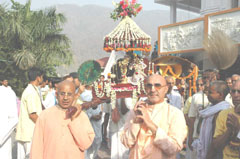
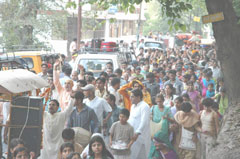
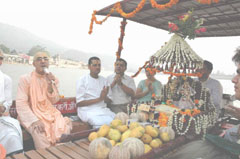
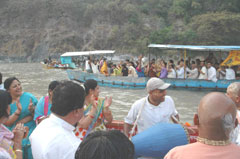
 Indian
spiritual guru Sri Sri Ravi Shankar drew huge crowds during
his recent tour of Southeast and East Asia and was also honoured
in Taiwan with an award for spreading his ideas on healthy living.
Ravi Shankar was on an 11-day tour of Singapore, Indonesia,
Hong Kong and Taiwan.
Indian
spiritual guru Sri Sri Ravi Shankar drew huge crowds during
his recent tour of Southeast and East Asia and was also honoured
in Taiwan with an award for spreading his ideas on healthy living.
Ravi Shankar was on an 11-day tour of Singapore, Indonesia,
Hong Kong and Taiwan. RISHIKESH,
March 13: The spiritual Guru, Sri Sri Ravi Shankar, has called
upon all communities to unitedly fight the scourge of terrorism.
Speaking to this correspondent at his kuteer in Rishikesh soon
after returning from the blast shaken temple town of Varanasi,
Sri Sri Ravi Shankar said "we have to take these challenges
with calm and fight it out collectively cutting across community,
religion and caste."
RISHIKESH,
March 13: The spiritual Guru, Sri Sri Ravi Shankar, has called
upon all communities to unitedly fight the scourge of terrorism.
Speaking to this correspondent at his kuteer in Rishikesh soon
after returning from the blast shaken temple town of Varanasi,
Sri Sri Ravi Shankar said "we have to take these challenges
with calm and fight it out collectively cutting across community,
religion and caste."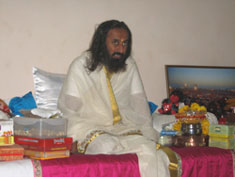
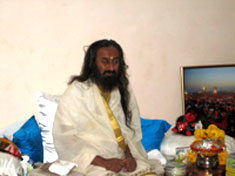
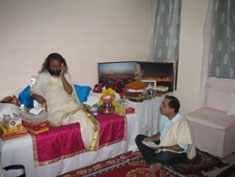
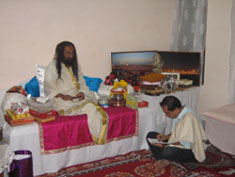
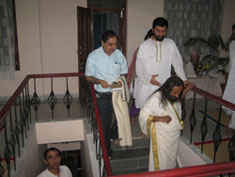
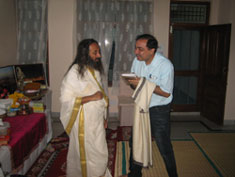
 Sri
Sri Ravi Shankar spoke of the power of silence and the inner
joy it can bring. Just as the crowd slowly opened its collective
eyes, coming back, as if from a trance, the band struck a triumphant
note and ushered in the Indian President, Dr A.P.J. Abdul Kalam.
Sri
Sri Ravi Shankar spoke of the power of silence and the inner
joy it can bring. Just as the crowd slowly opened its collective
eyes, coming back, as if from a trance, the band struck a triumphant
note and ushered in the Indian President, Dr A.P.J. Abdul Kalam. The
symbolic watering of a plant, Lakshmi Taru, by President Kalam,
Leader of the Opposition L.K. Advani, and other dignitaries
followed. Former Chief Justice of India, M.N. Venkatachalaiah,
welcoming the President, spoke of the power of the cultivated
breath that AOL has spread all over the world.
The
symbolic watering of a plant, Lakshmi Taru, by President Kalam,
Leader of the Opposition L.K. Advani, and other dignitaries
followed. Former Chief Justice of India, M.N. Venkatachalaiah,
welcoming the President, spoke of the power of the cultivated
breath that AOL has spread all over the world. He
gave practical action points to implement his plan for the 2020
vision for India. He, in his usual disarming manner, made youngsters
repeat his message.
He
gave practical action points to implement his plan for the 2020
vision for India. He, in his usual disarming manner, made youngsters
repeat his message. The
225-acre plot was a melting pot of geographical, racial, economical
and social boundaries. What happened was Upanishadic. It was
Vasudeva Kutumbakam: one world, one family, gathered from all
over the world to celebrate and share the joy of "unconditional
service to humanity".
The
225-acre plot was a melting pot of geographical, racial, economical
and social boundaries. What happened was Upanishadic. It was
Vasudeva Kutumbakam: one world, one family, gathered from all
over the world to celebrate and share the joy of "unconditional
service to humanity".  Sitting
on the stage were swamijis of different mutts, pontiffs of various
faiths and political dignitaries including Governor of Karnataka
T N Chaturvedi, Chief Minister H D Kumaraswamy, Deputy Chief
Minister B S Yediyurappa, Leader of the Opposition N Dharam
Singh and President of The Republic of Slovania Dr Janez Drnovsek,
besides a choir of around 3,800 musicians.
Sitting
on the stage were swamijis of different mutts, pontiffs of various
faiths and political dignitaries including Governor of Karnataka
T N Chaturvedi, Chief Minister H D Kumaraswamy, Deputy Chief
Minister B S Yediyurappa, Leader of the Opposition N Dharam
Singh and President of The Republic of Slovania Dr Janez Drnovsek,
besides a choir of around 3,800 musicians.  Governor
Chaturvedi lauded the efforts of Sri Sri Ravishankar and said
he had indeed fulfilled the prophecy of Vasudeva Kutumbakam.
Governor
Chaturvedi lauded the efforts of Sri Sri Ravishankar and said
he had indeed fulfilled the prophecy of Vasudeva Kutumbakam.
 "It's
a matter of pride for Karnataka that two events of immense spiritual
importance like the Mahamastakabhishekam at Shravanabelagola
and the AoL's Peace Conference have taken place in the State,"
he said. At a time when the world is becoming extremely materialistic,
messages of peace and harmony are extremely important, the deputy
chief minister added.
"It's
a matter of pride for Karnataka that two events of immense spiritual
importance like the Mahamastakabhishekam at Shravanabelagola
and the AoL's Peace Conference have taken place in the State,"
he said. At a time when the world is becoming extremely materialistic,
messages of peace and harmony are extremely important, the deputy
chief minister added.  NEW
JERSEY (USA), Dec 26: Indian Guru Sri Sri Ravi Shankar has said that peace would
dawn in troubled region of Kashmir in the months to come.
NEW
JERSEY (USA), Dec 26: Indian Guru Sri Sri Ravi Shankar has said that peace would
dawn in troubled region of Kashmir in the months to come.  Prior
to the New Jersey event, the Guru had blessed his followers for two days in New
York city through satsang, meditation and celebration to commemorate Christmas,
New Year and Holiday Season.
Prior
to the New Jersey event, the Guru had blessed his followers for two days in New
York city through satsang, meditation and celebration to commemorate Christmas,
New Year and Holiday Season.  Responding
to a question whether we can be successful materially and spiritually in this
world, the Guruji said "If you have intelligence you can. You can strike the balance
between the body and the mind." The Sunday's event drew families, couples and
friends from different parts of the US, including California, Chicago, Texas,
Pennsylvania, New York and even India.
Responding
to a question whether we can be successful materially and spiritually in this
world, the Guruji said "If you have intelligence you can. You can strike the balance
between the body and the mind." The Sunday's event drew families, couples and
friends from different parts of the US, including California, Chicago, Texas,
Pennsylvania, New York and even India.  NEW
DELHI, Nov 7: President A.P.J. Abdul Kalam Sunday inaugurated the mega temple
complex of Akshardham in the capital and dedicated it to the nation, saying it
would make every Indian proud.
NEW
DELHI, Nov 7: President A.P.J. Abdul Kalam Sunday inaugurated the mega temple
complex of Akshardham in the capital and dedicated it to the nation, saying it
would make every Indian proud.  COLOGNE,
Aug 21: More than 1 million Roman Catholic young people who had camped out overnight
in an enormous field welcomed Benedict XVI on Sunday for the concluding Mass of
his four-day trip to Germany, his first foreign travel as pope.
COLOGNE,
Aug 21: More than 1 million Roman Catholic young people who had camped out overnight
in an enormous field welcomed Benedict XVI on Sunday for the concluding Mass of
his four-day trip to Germany, his first foreign travel as pope. BAD
MEINBERG (GERMANY), Aug 17: I have been a student of Yoga for the past 10
years. My business contacts with Bretz brothers exposed me to the Yoga Vidya Centre
in Germany. Both the Bretz brothers run the Haus (House) Yoga Vidya, with more
than 30 centres in Germany itself. Though the institute has been conducting the
teachers training programme for over a decade, it was for the first time that
it conducted the course in English.
BAD
MEINBERG (GERMANY), Aug 17: I have been a student of Yoga for the past 10
years. My business contacts with Bretz brothers exposed me to the Yoga Vidya Centre
in Germany. Both the Bretz brothers run the Haus (House) Yoga Vidya, with more
than 30 centres in Germany itself. Though the institute has been conducting the
teachers training programme for over a decade, it was for the first time that
it conducted the course in English.  The
popularity of the Yoga Vidya Centre is such that as many as 20 international students
from as many countries attended the English batch. There were nearly 400 other
students who were there for the classes in German. Needless to say that I was
the only Indian amongst such a large group. Everybody looked up to me with respect.
It made me feel proud to be an Indian. However, most people could not figure out
why I was learning yoga here and not in India.
The
popularity of the Yoga Vidya Centre is such that as many as 20 international students
from as many countries attended the English batch. There were nearly 400 other
students who were there for the classes in German. Needless to say that I was
the only Indian amongst such a large group. Everybody looked up to me with respect.
It made me feel proud to be an Indian. However, most people could not figure out
why I was learning yoga here and not in India.  One
of the grand Masters of Yoga of the 20th century, Swami Shivananda is the inspiration
behind all Yoga Vidya centers. Over 20 years ago, one his disciples, Sukhadev
Bretz, took it upon him to spread the message of Yoga in Germany and today he
can boast of having trained thousands of teachers who are now all across the globe
teaching this ancient Indian art of Yoga.
One
of the grand Masters of Yoga of the 20th century, Swami Shivananda is the inspiration
behind all Yoga Vidya centers. Over 20 years ago, one his disciples, Sukhadev
Bretz, took it upon him to spread the message of Yoga in Germany and today he
can boast of having trained thousands of teachers who are now all across the globe
teaching this ancient Indian art of Yoga. God’s
symbol, according to Patanjali, is the syllable AUM. This sound is divine: it
stands in praise of divine fulfillment. AUM is the universal sound (sabda brahman).
Philosophically, it is regarded as the seed of all words. No word can be uttered
without the symbolic sound of these three letters, a, u, and m. AUM represents
communion with God, the Soul and with the Universe.
God’s
symbol, according to Patanjali, is the syllable AUM. This sound is divine: it
stands in praise of divine fulfillment. AUM is the universal sound (sabda brahman).
Philosophically, it is regarded as the seed of all words. No word can be uttered
without the symbolic sound of these three letters, a, u, and m. AUM represents
communion with God, the Soul and with the Universe. ROME,
July 10: Pope John Paul II's closest aide said in an interview on Saturday that
he hoped the late pontiff would be made a saint during World Youth Day in Cologne,
Germany next month.
ROME,
July 10: Pope John Paul II's closest aide said in an interview on Saturday that
he hoped the late pontiff would be made a saint during World Youth Day in Cologne,
Germany next month. NEW
DELHI: The word Yoga is derived from the Sanskrit root yuj meaning to bind, join,
attach and yoke, to direct and concentrate one's attention on, to use and apply.
It also means union or communion. It is the true union of our will with the will
of God.
NEW
DELHI: The word Yoga is derived from the Sanskrit root yuj meaning to bind, join,
attach and yoke, to direct and concentrate one's attention on, to use and apply.
It also means union or communion. It is the true union of our will with the will
of God.  The
practice of yoga helps the lazy body to become active and vibrant. It transforms
the mind, making it harmonious. Yoga helps to keep one's body and mind in tune
with the essence, the soul, so that all three are blended into one.
The
practice of yoga helps the lazy body to become active and vibrant. It transforms
the mind, making it harmonious. Yoga helps to keep one's body and mind in tune
with the essence, the soul, so that all three are blended into one. Yama
and Niyama are the basic codes of yogic life and control the yogi's passions and
emotions and keep him in harmony with his fellow men.
Yama
and Niyama are the basic codes of yogic life and control the yogi's passions and
emotions and keep him in harmony with his fellow men. NEW
DELHI: It was a 'Day of Women' at Gobind Sadan, a unique religious place where
people of all casts and creed work, worship and live together as one family. The
women from India, the US, Russia, Kazakhstan and Bashkirir celebrated the unique
strengths bestowed on the better half to mark the International Women's Day on
March 8.
NEW
DELHI: It was a 'Day of Women' at Gobind Sadan, a unique religious place where
people of all casts and creed work, worship and live together as one family. The
women from India, the US, Russia, Kazakhstan and Bashkirir celebrated the unique
strengths bestowed on the better half to mark the International Women's Day on
March 8. Baba
Virsa Singh reminded that women were given great respects in all traditions be
it Hinduism, Islam or Sikh. "In India we always take the name of woman first
be it Sita-Ram or Radha-Shyam. Even before offering 'Ahuti' of incense or ghee
in the 'Havan' to Agni Devta (the God of Fire) we take the name of his wife, Sawaha.
In Islam, Fatima is known as the 'Woman of Heaven' and Arabia is considered a
great saint. In Sikhism, Guru Nanak praised women and told men of the time 'How
can you denigrate those who give birth to our kings?'
Baba
Virsa Singh reminded that women were given great respects in all traditions be
it Hinduism, Islam or Sikh. "In India we always take the name of woman first
be it Sita-Ram or Radha-Shyam. Even before offering 'Ahuti' of incense or ghee
in the 'Havan' to Agni Devta (the God of Fire) we take the name of his wife, Sawaha.
In Islam, Fatima is known as the 'Woman of Heaven' and Arabia is considered a
great saint. In Sikhism, Guru Nanak praised women and told men of the time 'How
can you denigrate those who give birth to our kings?' KATRA,
Feb 3: About 2.50 lakh pilgrims from within and outside the state have visited
the holy cave Shrine of Mata Vaishno Devi Ji during the month of January this
year. During the corresponding period of last year 2.24 lakh pilgrims had darshan
at the holy cave shrine. In the second fortnight of January 2005 over 1.08 lakh
devotees paid their obeisance at the holy cave shrine of Mata Vaishno Devi Ji.
KATRA,
Feb 3: About 2.50 lakh pilgrims from within and outside the state have visited
the holy cave Shrine of Mata Vaishno Devi Ji during the month of January this
year. During the corresponding period of last year 2.24 lakh pilgrims had darshan
at the holy cave shrine. In the second fortnight of January 2005 over 1.08 lakh
devotees paid their obeisance at the holy cave shrine of Mata Vaishno Devi Ji. In
this present environment of the world, greed and selfishness have overpowered
the body, mind and intellect of man. As a result of this, he has lost the peace
of mind resulting in various physical and mental problems. The solution of this
problem lies only in religion and spiritualism. To achieve success in this field,
control of mind, concentration and meditation are the best means. Mind torments
man in the field of his day-to-day life and the worldly problems. What is mind
after all? It is only a bundle of thoughts. According to the saints, the mind
is like water, basically pure and divine but is made impure or coloured by our
good or bad actions.
In
this present environment of the world, greed and selfishness have overpowered
the body, mind and intellect of man. As a result of this, he has lost the peace
of mind resulting in various physical and mental problems. The solution of this
problem lies only in religion and spiritualism. To achieve success in this field,
control of mind, concentration and meditation are the best means. Mind torments
man in the field of his day-to-day life and the worldly problems. What is mind
after all? It is only a bundle of thoughts. According to the saints, the mind
is like water, basically pure and divine but is made impure or coloured by our
good or bad actions.